#i reliabled our unreliable narrator
Explore tagged Tumblr posts
Text
Rereading my old fics and criticising myself with “THEY WOULDNT SAY THIS”
#i made richard papen admit to begging#what the fuck was i on#the secret history#shut up stef#i reliabled our unreliable narrator#richard papen
7 notes
·
View notes
Text
if your primary source of information on transmascs is by anyone else but a transmasc, it's not a reliable resource. it's currently viewed as perfectly okay for everyone BUT transmascs to talk about our experience- and in fact, it's encouraged for people to listen to everyone but us, because according to other people we're unreliable narrators, we "skew the truth," we "lie", that transmascs "already have too much space and too many people talking about transmasc issues", and that testosterone turns us into "irrational monsters".
i get it: people's internalized misogyny makes them treat us like we're too stupid to relay our own lived experiences because we're just "dumb, confused women." we get it- your misogyny is palpable. it morphs into a new, heinous experience- transandrophobia- once people begin telling us testosterone makes us evil, antimasculism begins to bleed into the misogyny that built this experience and turns it into something even more insideous.
people will do everything in their power to listen to everyone else talk about our experience, but when it comes to us advocating for ourselves, that's not allowed. everyone wants to speak for us, to tell us what their perception on transmasculinity is based off of a few passing experiences with transmascs so they "know what it's all about".
please seek out transmasculine people to listen to about our lived experience. everyone who attempts to speak for us has an agenda. don't listen to anyone but the source. outside speculation has no place when it comes to discussing the transmasculine experience, especially when it comes to saving young transmascs from feeling lost and totally alone
no one can tell our stories but us. stop being okay with people who aren't transmasc spreading lies about what we live through. our experiences need to be heard. let us speak for ourselves. stop putting words in our mouths and telling US how we live our lives
#lgbtq#lgbt#lgbtqia#queer#trans#transgender#transmasc#nonbinary#transmasculine#trans man#ftm#genderqueer#trans men#trans guy#genderfluid#bigender#multigender#our writing#transandrophobia
2K notes
·
View notes
Note
However— well, is Tommy a reliable narrator to himself? Sure, Eddie basically stopped talking to him, but what about Tommy? Did he also delay replying to the 118 so that the time between messages stretched out? Did he think they were only trying to be nice by keeping in touch with their teammates’ ex (never mind that he was Hen and Howie’s teammate first) and he’d prefer to not have their ‘pity’ and cut them off (again)? Did he cut them off preemptively and doesn’t see it that way because if he did then he’d have to also face the fact that he’s a little messed up? We probably don’t have time for them to delve into all of this on screen but it’s interesting to chew on. For reasons.
(Chim gets a pass for the post-throat slashing time of no contact because he was… let’s say preoccupied.)
oh 100% hang on let me get my coffee
okay, SO. mr unreliable narrator over here, mr enjoy it while it lasts, is never going to be the one with the full picture, because he sets it up that way - intentional or not, i feel like tommy is someone who has his view of the world and his role in it and just quietly, fatalistically makes that happen.
so i can totally see a world where no one from the 118 reaches out, full stop. but, y'know, phones work both ways, thomas. BUT. for tommy, that's buck's family. they're buck's people. (and look, my wife has a much closer relationship with her family than i do, and a much larger circle of friends, and it took me WAY longer than six months to start feeling like they were our people, not her people i got to hang out with through her.)
we know that tommy's a jealous guy, and we also get the sense that he's pretty fatalistic, so if no one reaches out, i can see that landing for him as "well, obviously. they never really wanted me around, of course i was never gonna be part of that" and just exacerbating his envy, but also his sense that that chapter of his life is Over Now. i can see the lack of contact from hen and chim actually not stinging that much (or tommy telling himself it doesn't sting that much, genuinely believing that, my king of unexamined feelings) because they're not friends, right? chim calls him when he needs a favour, but they're not close. he's not on hen's christmas card list (and that's genuinely fine, i mean zero shade to anyone involved here. they were friends by the time he left the 118 but for all we know they were mostly or entirely work friends). so i can see his internal monologue about that, his confirmed belief being 'well, hell, i wasn't enough for them to want around on my own merits before, why would i be now'. (again, this is not shade on hen or chim. phones work both ways and my special little guy is fucked in the head.)
eddie's gotta sting a little more because they were friends, right? actual friends. but if we're taking tommy at face value, then we have to assume he feels some kinda way about being friends with eddie once he and buck are together. i don't think he actually thinks anything is happening/has happened/will happen with buck and eddie, but we do get this delicious hint with that little scoff about eddie's straightness that maybe tommy has experience of that queer classic - losing years of your life being besotted with your ride or die straight bestie (sal!!!! but uh. that's a separate post.).
i lost my thought. wait. okay, so i think one of the fundamental mismatches is that for six months buck was in an x-rated rom-com and tommy was navigating something unbelievably fucking complicated because talking? communicating? who does that when you can just make up a scenario and stick to it like your life depends on it. (worth noting there's no way that scenario ends well for him, but uh, that's why i love him. go listen to settle for me from crazy ex girlfriend lol)
i can ALSO see the other part of what you said. tommy says eddie 'pretty much' or 'basically' (can't remember the wording right now and not in a position to check) stopped talking to him which does leave room for some contact. (it could also be read as a kind of deflection of the ouch of it all but ymmv.) so i can see a world where eddie sends a 'man wtf happened?' message which...tommy's not going to reply to that. he's just not. but changing the subject immediately is too obvious so he has to wait a while to say something innocuous, and it just kind of fizzles out.
whatever happens, whether it was zero contact or intermittent, declining contact, my special little guy, my world champion runner, my sad sad man was 100% thinking 'yeah, that tracks'. we definitely don't have time for the show to delve into that, and honestly it's not really that kind of show so i wouldn't expect it, but rest assured i am C H E W I N G
#bucktommy#911 spoilers#tommy kinard#blorbo of all time#leashy yaps#<- boy does she ever. girl shut up#thinking about tommy kinard hours again#aka i'm awake!
125 notes
·
View notes
Text
SUZANNE COLLINS: SOTR EXCLUSIVE EDITIONS INTERVIEW
This is a transcript from the Barnes & Noble / Waterstones exclusive edition interview. To my knowledge, they are the same.
Not to be confused with interview on her website, which you can find here.
transcript below
DL: Did you always know you’d write a novel about the second Quarter Quell? If not, what compelled you to return to this particular point in the Hunger Games timeline?
SC: I always start with the underlying ideas—in this case, implicit submission, the uncertainty of inductive reasoning, propaganda, love—and they find their way to the story that supports them. But yes, I think I did want to do Haymitch’s story because I’ve always known that the version Katniss and Peeta saw on the train was very misleading. When I landed on implicit submission and its dependency on propaganda, Haymitch’s was the natural tale to tell. Just like the state of nature debate led naturally to Coriolanus’s story.
DL: The quote at the start of the book from the philosopher David Hume is a very telling one. It starts, “Nothing appears more surprising to those, who consider human affairs with a philosophical eye, than the easiness with which they are governed by the few; and the implicit submission, with which men resign their own sentiments and passions to those of their rulers.” This feels like a key to the entire book.
SC: If all people do is read the full Hume quote and discuss it, this book has been a win for me. This quote invites so many questions. Like, “Do you think Hume is right? As human beings, do we ultimately end up being governed by a few people? Not in, say, a totalitarian state, but in a democracy?” (After thinking about it, every single person I asked about this said yes. No one seemed happy about it.) “But why have we resigned our own sentiments and passions to those rulers? Why are we implicitly submitting to this? Especially since force is on our side, as the governed.” Hume answers that for us. We’re allowing ourselves to be controlled by “opinion.” And that’s where propaganda comes in.
All right, then, “What propaganda do we all consume on a daily basis that maintains this status quo? Is it harder to maintain in an autocracy or a democracy where we pride ourselves on our intellectual or political freedom? How much propaganda does it take to make you think that implicit submission is what you want? Is it inevitable? Is there a way to protect ourselves against it? What would that entail?”
DL: Haymitch is starting at a very different place than Katniss or Coriolanus—while his life has had its sadness, it’s largely been a good life so far. How does that change the stakes within the novel?
SC: Yes, his life has been largely good. A loving family, good friends, the love of his life. A sweet part-time job that may lead to a profitable, if illegal, career. He’s happy except for the shadow of the Games that hangs over them all. So, emotionally, his loss is the greatest because he has the most to lose. And unlike Katniss and Coriolanus, who have loved ones to the end, Snow tries to strip Haymitch of everything: family, friends, lover, job, community, happiness, and the freedom to love anyone. His personal stakes couldn’t be higher.
DL: What was it like to be creating a new work that you’d already loosely outlined in Catching Fire?
SC: Actually, it helped. Younger me provided a protagonist, his arena, his overall arc, and some of the cast, including Maysilee Donner. Having to build off the recap, not having everything to decide, meant some extra challenges on the plotting side, but ultimately it was freeing. I just had to work within what was established. Of course, knowing that the narrative had been manipulated into a piece of Capitol propaganda gave me a lot of freedom as well.
DL: It’s such an interesting scenario, to have our very reliable narrator understand that he is surrounded by so many unreliable narrators — and that, in fact, unreliable narration is a powerful political tool. The “card-stacking” that helps him a little in the beginning (with Plutarch using the manipulation as an excuse to give Haymitch time with his family) ends up being existentially overwhelming when Haymitch watches the “recap” of the Games and realizes how history is truly written by the victory (and not the Victor). To me, this felt like the biggest revelation to Haymitch — the sheer degree of manipulation. Can you talk a little about how this revelation about propaganda sits within the larger scope of the series?
SC: After he watches the reaping on the train, Haymitch realizes that he’s the Gamemakers’ puppet and that they will manipulate his image and actions to serve their needs. Within the arena, he can only wonder what they’re showing the audience. But the full force of their deception doesn’t hit him until he sees how completely they’ve changed his story the night he’s crowned. Remember, too, that in order to appease Snow and protect his loved ones and, when that fails, to fulfill his promise to Lenore Dove, he has to carry the Gamemakers’ narrative forward as the absolute truth. It’s an enormous burden that he bears alone because all of his allies who lived the truth are dead. Keeping the real version straight in his own head while promoting the fabricated version would require constant vigilance. But deep down, even through his white liquor fog, he realizes it’s imperative that he do it. If he can’t distinguish between the two, the Capitol wins. This foreshadows Peeta’s hijacking in Mockingjay and reinforces the question the whole series asks about the information we’re consuming: “Real or not real?”
DL: If I could give you a time machine back to when you were writing Catching Fire, would you have asked yourself to do anything differently?
SC: No, but maybe in the Mockingjay book. I might have shortened the period between Haymitch being crowned victor and when he loses his family. It doesn’t need to be two weeks. Although it does give Snow an additional window to torment him in the Capitol. But really, he could have gone straight home after the Victor’s Ceremony.
DL: Besides Haymitch, was there any other character from the trilogy that you particularly enjoyed revisiting in Sunrise?
SC: I love doing all of them: Plutarch, Effie, Beetee, Mags, Wiress, Burdock, Asterid. Getting to share who they were and what motivated them. They didn’t arise fully formed in the trilogy. All the characters are on journeys. Beetee losing Ampert, Effie clinging to her Capitol beliefs, Asterid healing the sick in 12, Plutarch still staying in the games. Everybody has their own story.
DL: One of the most fascinating things about seeing the Games play out over time — going from the Tenth to the Fiftieth to the Seventy-fourth and Seventy-fifth — is understanding both the evolution of the Games and the evolution of the roles within the Games. In particular, I’d love to ask you about the contrast between Drusilla and the Effie of the Trilogy. There seems to be a profound generational difference that shapes their view of their role in the Games — and, indeed, seeing the start of Effie’s relationship here made me suddenly understand the dynamic that must have governed District 12 tributes for the next twenty-five years. Can you talk about what makes Drusilla tick versus what ultimately makes Effie tick?
SC: As escorts, both Drusilla and Effie are ambassadors for the Hunger Games. Drusilla who lived through the cruelties of the Dark Days, has channeled her experience into vengeance against the districts. She’s dehumanized her enemy, referring to them as beasts and pigs, and she has no qualms about ushering the piglets into the arena. Effie, born decades after the war, has embraced the Hunger Games as her patriotic duty. She’s been raised on them as necessary evil and a reminder of a war that Panem can never afford to repeat. Unlike Drusilla, she believes all the participants have a noble role to play. That begins to wear thin over the years. Every Games it becomes harder to justify the atrocity. You can see her clinging to good manners for reassurance of humanity’s decency. But in terms of the Hunger Games, Effie being assigned as their escort was a lucky break for District 12. She might be ridiculous, but she’s not malicious.
DL: Even though Maysilee is mentioned in Catching Fire, we really get to know her for the first time in this book. In many ways, she’s not so much defined by her privilege as she is by her lack of control over her life — when we first talked about her, you said she was “indentured into a life she doesn’t want.” What do you think fuels Maysilee, both in the arena and out of it?
SC: Rage. She’s one of the angriest characters I’ve ever written. She’s mad about the injustice of the world she’s born into and not it threatens and limits her life on every level. Before she’s reaped, that just manifests as meanness. But once she’s reaped, she begins to evolve and focus that emotion on the Capitol. She remembers who the enemy is.
DL: Snow makes quite an appearance when he arrives at Plutarch’s apartment. What was it like to see him in this era, after spending so much time with his younger self when writing Ballad?
SC: When I started working on this book, for the first time Snow and I were about the same age. We’re both entering our third act. I could feel his middle-agedness in mind and body, imagine his lost and realized dreams, and sense the cost of maintaining them. He's devoted his whole life to controlling Panem. But the work will never be done. It's exhausting.
Emotionally, he's beginning to reflect back on his life. His loves and losses. His resentment at the Heavensbee library when his own childhood books were burned for warmth, his cynicism over Haymitch's romance, his fear and loathing of District 12. I enjoyed having Lucy Gray's memory rise up and disrupt his life.
DL: And poor Haymitch doesn't even know why he's setting Snow off! But that does lead me to a question about Lenore Dove, who has grown up in a very different Covey world than Lucy Gray. How do you feel her outlook is shaped by her Covey roots?
SC: Lenore Dove romanticizes the Covey's prewar days as itinerant musicians on the open road. She also knows the losses that followed, the murdered parents and orphaned Covey children. And in particular, she's haunted by the fate of Lucy Gray. She wears bright bits of Lucy Gray's dress about her person and keeps her forbidden lyrics alive in private performances for Haymitch and Burdock. The Capitol has never meant anything but oppression and pain for her people; and that fuels her desire to bring it down.
DL: And how did Poe become such a part of the book?
SC: Haymitch's love needed a name. Since she's Covey, that starts with a ballad. I knew she'd died young, as Haymitch mentions this in Mockingjay. So, love of his life - her early death + his relentless grief = Edgar Allan Poe. I’m right back at the Romantic poets again. Even then, I’ve got several poems to choose from — “Annabel Lee,” “Ulalume,” “Lenore,” “To One in Paradise” — but I couldn’t resist “The Raven.”
DL: One of the things I love about Ballad and Sunrise is that they make the series much more about “the long game,” showing that the events of the trilogy don’t happen because the right girl shows up at the right time, but because of decades of planning. In many ways, Plutarch’s extremely ambiguous role is the biggest acknowledgment we have of long-game tactics. I don’t want you to try to pin him down here — I know he is ambiguous for a reason — but perhaps you could discuss his role.
SC: Plutarch’s the master of the long game. In Sunrise, we see him as a young man who’s convinced the government needs overthrowing, but he’s just taking his first baby steps. by the time we get to the trilogy, he’s masterminding the rebellion. He’s built a network in both the districts and the Capitol. He’s found an army in District 13 and allied with Coin. When Katniss shows up, he’s got a Mockingjay for his propaganda. He orchestrates the Airtime Assault that brings down the Capitol. And he manages to do all of this while convincingly playing a Gamemaker.
He doesn’t glorify humanity. At the end of the war, he tells Katniss, “We’re fickle, stupid beings with poor memories and a great gift for self-destruction. Although who knows? Maybe this will be it, Katniss.” And when she asks what, he answers “The time it sticks. Maybe we are witnessing the evolution of the human race.” So, at heart, he’s an optimist. He doesn’t accept that war and self-destruction are inevitable. Plutarch believes that we’re all on a continuum. We’re all ultimately playing the long game. You may fight your whole life for a greater good and never see the fruits of your labor. Plenty of people have done that historically. And so he tells Haymitch, “You were capable of imagining a different future. And maybe it won’t be realized today, maybe not in our lifetime. Maybe it will take generations. We’re all part of a continuum. Does that make it pointless?” I think that’s a question we all have to ask ourselves.
DL: When we first discussed the manuscript, you told me, “Books are part of Plutarch’s privilege.” In seeming contrast, there is the transmission of stories through song that we see echoing within Haymitch. I’d love for you to share more about this and the role books and songs play in the storytelling within this series.
SC: The Heavensbees have enormous wealth and privilege and, largely thanks to Trajan Heavensbee, that has allowed them to collect and protect an impressive library. The only other personal collection we’re sure exists belongs to the Covey. Much smaller, of course, but it’s apparently got some great books in it. Poetry, philosophy, literature, and at least one guide to raising poultry. The only book the Everdeens owned was the edible and medicinal plant guide they made themselves. That expands into the memorial book at the end.
District 12 doesn’t have many books, but they have plenty of songs. Why? Because a book can be burned, but you can’t burn a song. It can be passed along from person to person without a trace, no physical form required. Theoretically, you could commit a book to memory, like in Fahrenheit 451, but that’s a talent not everybody’s going to share.
By the trilogy, the songs have been discouraged as well. Under Snow, the live music in 12 devolves from the Covey performing in the Hob in The Ballad of Songbirds and Snakes to a trio of instrumentalists in Sunrise on the Reaping to a lone fiddler (Clerk Carmine) in the trilogy. Lucy Gray’s songs, which Katniss sings unaccompanied in the trilogy, are held in memory and are passed along orally. Snow would love to stamp them out entirely, not just because he doesn’t like music, but because they’re powerful politically. A protest song like “The Goose and the Common” can articulate an injustice, stir people up, and become a rallying point.
DL: Just because you mentioned it, I’m going to ask: Are Snow and Clerk Carmine the only two people we see in Ballad, Sunrise, and the trilogy? (I won’t ask what Tigris is up to during Sunrise, but whatever it is, I know it’s good.)
SC: Yes, I think it does come down to Snow and Clerk Carmine. A handful of Snow’s classmates might still be around by the trilogy, but they’re not named characters.
DL: I’m fascinated by the surface similarity of Katniss’s, Coriolanus’s, and Haymitch’s family structures. All have dead fathers. All are being raised by a mother or grandmother. All have a single sibling or cousin in their care. But even if the structures are alike, their experiences vary. In what ways do you think they were shaped similarly by this structure and in what ways were their upbringings different?
SC: You see this a lot in books for young audiences, where the protagonist is orphaned or placed outside of parental protection, leaving them to fend for themselves. It requires them to be responsible for their own survival and choices.
Haymitch has always had at least one functional parent, which is not true of the others. I think this has allowed him to be more open-hearted and optimistic than the other two heading into the story. Coriolanus is orphaned during the war and his grandmother does an impressive job keeping him and Tigris alive, but by the time that book opens she lives in her own world and her grandchildren care for her. Katniss loses her mother to grief and depression when her father dies and becomes her family's provider and protector at age eleven. Haymitch doesn't have to take full responsibility for himself until he's reaped.
DL: The role of the sibling (and I count Tigris as a sibling) is also so important within the series, to the degree that, in this book, becoming a "found" sibling is the highest mark of trust. Can you talk about exploring that dynamic within the series?
SC: In Ballad, when Coriolanus is filling out Lucy Gray's questionnaire and there's no place to record her cousins, he thinks, "There should be a place for anyone who cared for you at all. In fact, maybe that should be the question to start with: Who cares about you? Or even better, Who can you count on?" There's the family you're born into and the family you choose. All the protagonists have trustworthy families to begin with, but they adopt "found" siblings as well and those bonds are born of experience. Maysilee for Haymitch, Finnick for Katniss, even Sejanus for Coriolanus. People who care about you that you can count on. They replicate the natural sibling bond and aren't limited by biology. All of them ultimately find siblings among people they once viewed as antagonists.
DL: With the Newcomers, we see a different angle to the presentation of alliances within the Games — and in some ways, this alliance is in conversation with the alliance that forms in Catching Fire. In many ways, alliances are the unsung hero of the series, especially when we look at the long game. What does Ampert establish with the Newcomers that echoes throughout the series?
SC: Ampert’s laying the groundwork for the rebellion later with the district alliance in the third Quarter Quell. It’s a work in progress. Even in the trilogy, we’re well into the war before the rebels finally get all the districts on board. But Ampert’s message wins out. “We don’t have to put up with living under the Capitol’s rule. We have greater numbers, more power, more strength. We can change our lives.”
DL: I love how within Sunrise we see how Mags’s and Wiress’s mentoring styles contrast — and neither one is at all like Haymitch’s mentoring style in the trilogy. I can’t believe I’ve never asked you this question before, but of all the characters we’ve seen across the five books, which one would you most want to be your mentor?
SC: Haymitch, but not until the trilogy when he pulls himself together. Before that, I think I’d go with Mags, who’s brought home several victors while retaining her humanity.
DL: How thoroughly do you outline before you start writing?
SC: Pretty thoroughly, this time more than usual. I started with Post-its and laid out everything that was established about the second Quarter Quell in the version that Katniss and Peeta watch on the train in Catching Fire. Then I added in a few things that Haymitch mentions to Katniss in Mockingjay. And finally, I overlaid that with the story of what really happened. Additionally, I had to weave in characters and events from the past and the future.
There are a lot of balls to keep in the air. Multiple versions exist of, say, the reaping: the one we live through with Haymitch, where Woodbine gets killed; a second that’s aired to the public after the delay; a third of Plutarch’s card-stacked edit that they broadcast the night of the reaping that includes footage of Ma and Sid; and a fourth version played during Haymitch’s Victor’s Ceremony, which seems quite close to the one Katniss and Peeta view, but it could have been tweaked a bit over time. It’s a lot to keep straight.
DL: In terms of the smaller connections between this book and the other books (like the use of the word sweetheart or the presence of geese in Haymitch’s early story), were these things you knew going into the book from the start, or were they things that happened when you were putting words to the page?
SC: These were things I knew about, but I didn’t know if I’d ever write Haymitch’s story and have the opportunity to lay in their history. So many things are like that when you’re building a world. But Haymitch’s decision to tend geese at the end of Mockingjay wasn’t random.
DL: And, of course, for my final question I need to ask... what do you have against gumdrops?SC: Not a thing.
138 notes
·
View notes
Text
A few things about Carmen.
First of all, I'm biased because there are many things that imply she wasn't the greatest person even before she got Brain Vat-ed, but my entire Brand is "we have to look at things objectively and by looking at the facts in order to get a full and accurate picture of the way things are, not how we simply want them to be," so I'm going to do that. As best as I can.
Okay, so... what we know about her before she died is limited completely to other peoples' testimony, which is highly important because as we know from my other posts, Everyone Here Is An Unreliable Narrator.
That said, let's take a look at a few of those things.
I'd love to use images to prove I'm getting the dialogue straight from the game on every single line, but unfortunately Tumblr has an image limit of 30 per post! So. After a point, text only it is.
Starting from the past!
First, and the most recent (chronologically) yet objective of those takes on her, is Binah. Whose entire deal is to see things without getting caught up enough that you don't see the bigger picture, funnily enough!




Roland: Hang on, what? You mean the Carmen who recruited people for her quest to cure humanity? Binah: She strove to create a world without conflict. To elaborate, her idea of utopia was one in which people did not harm each other, and could mutually understand. She dreamed of a world where people could dream. Alas, she could never reach that ideal herself.
Now, this is interesting, because as said, Binah is someone who was never part of the team, who never followed Carmen, and the person she is interested in watching isn't Carmen - it's Ayin. He, after all, was the one who by the last loop could face his fear of her and confront her head on in her meltdown.
But she was also the one who was interacting with her the most over the past ten thousand years, unable to go mad from her dealings with the Bucket and Well. So there's this:

So. Yeah. Binah's had Carmen to talk with over that length of time.
We can see from this that Carmen's original goal was, in fact, to create a utopia where no one hurt each other and people could have their own dreams, rather than just the ones that the City gave to them (the need to survive).
However, that's not all we know about her.
Let's look at memories from those who actually interacted with her!
The problem here is that for the most part... that's reduced to one person: Ayin. And he's hardly reliable here! But... there are a few places where we can see others' perspectives, one way or another, and just because he's an unreliable narrator doesn't cause his opinions and memories from being useless for our needs here.
That's for the most part. We also have Angela and the Patron Librarians in Ruina to think of.
We know that she was someone who was warm and full of life, courtesy of Ayin, Angela, and Netzach:

Netzach: All I could think about was how brilliant and alive a person could be. She went on about how she'll change this world and its people. Whenever I saw Carmen brimming with joy and pride for her cause, I felt alive too.
We know that Carmen had fond memories of and warmth for Ayin:

Angela: Why did you have to model me after a person with fond memories of you?
And that she was excited to see people choose to work with her for her cause, and that she "wasn't the manipulative sort of person."

A(yin) [flashback]: Just ike everyone else, Michelle liked Carmen. That was not trickery or a show. She wasn't the manipulative sort of person who'd keep up such a facade, either.
She could understand that she had certain privileges, that others did not, but still wanted to help them:

Carmen: You know, I don't have any true contact with the lives of the people from the Backstreets, nor the pain they go through. From that I've always felt so ashamed of everything, even to be graced by a small ray of sunshine.

Gebura: But Carmen told me that she wouldn't give up on anyone, even people like us.
She was a workaholic who looked out for others:

A(yin): Th only problem was that Carmen was too wrapped up in taking care of others. She never had a moment to take good care of herself.
Carmen was the one who encouraged them to save Lisa and Enoch, from the Outskirts, and ensured that they'd be looked after:

Lisa: Besides, Carmen told us that we didn't have to worry about anything here, too. A(yin): Carmen personally asked her to bring the children here.
It was the trust between Carmen and the team that caused Daniel to choose Carmen's group over literally any other Wing:

Chesed: Manager, do you know why I chose to join your small company, instead of any other grander Wings? [...] It was because I liked how everyone here trusted Carmen.
All of which seems positive, right?
Except... the seeds (ha) of her becoming the sort of person who would shift "bring out the best potential in people" to "aren't you through with being nice? don't you want to be selfish and distort?" were there from the beginning.
In the very scene where Ayin is saying that Carmen isn't the manipulative sort of person, he also recounts that she had done this:


A(yin): If your beloved parents, or your precious friends try to coax you, are you confident that you'll be able to refuse them? A(yin, narrator: She wasn't able to say anything to my browbeating. Carmen broke the silence instead. Carmen: Don't be too harsh on her. She's amazing to be here at such a young age!
Maybe on its own, this would be a harmless action, but bear in mind: they are currently in or heading to a lab that is in the Outskirts for the sake of evading the eye of the Head. Ayin is watching out for Michelle by warning her of the very real danger she is putting herself into, if she isn't strong enough.
And Carmen brushes over his concerns, overrules him, and ignores the potential danger.
One could argue that this is a simple mistake, however it happens over and over again in the course of the flashbacks.
Over and over, she is able to be dismissive of others, not looking past what she sees in the moment, yet able to plan ahead, which is said to X right all the way back in Day 9:

Angela: [Alright, the letter ‘C’. Not a bad choice.] Persons who select C believe that the process is more important than the outcome. Therefore, they are good at planning ahead and enjoy change. They will be able to gain insight and attain inner growth without being confined by the rules.
"Okay, but how is she dismissive of others? We've only seen her support Michelle so far!" Right then.


Kali: By the way, who's the guy glaring at me? Carmen: Oh, that's A(yin). He just always has a serious look on his face.
Effectively, she dismisses Kali's concerns about Ayin not trusting her, but also makes a joke out of Ayin's own RBF (which most likely has its origin in a lethal mix of autism and depression, based on my own read of him).
Even if all Carmen intended was to break the ice, this is not conducive to communication. No one's concerns are alleviated. Kali may now potentially dismiss Ayin's expression as irrelevant.
Daniel's recruitment comes with a double-whammy.

A(yin), flashback: "He's a bit pompous, so don't believe everything he says," she said to me.
Which is bad enough, encouraging your junior who has been with you this long to dismiss the words of someone who is choosing to work with you. These two people will be working together, and there is a certain irony in how Daniel chose to join Carmen's team because they all trusted her...
...but these last two especially beg the question - did they all trust each other?
And here's the other side of the Whammy, which also comes in two parts:

A(yin): I asked how she was able to recruit such an elite. Carmen answered nonchalantly, as if I had asked about something trivial. "Don't you know that by now?"
And as to what "that" might be... here's this, from when Daniel had just arrived, asking how she knew he was coming:

Carmen: I told you. No matter how great you may be, you will always be in the palm of my hand.
...excuse me, what was that?
Because first off, we have a certain level of pride and arrogance, in how she "nonchalantly" answers about how she could recruit someone from the elite. To her, this is something she can just do with ease. She sees no great feat where others would have to struggle.
But then there's this phrase: No matter how great you may be, you will always be in the palm of my hand. This gave me an immediate sense of discomfort when I first saw this scene. Not to mention, it's used in far less benign ways later on; Angela to Chesed (who she has been forcing to do unsavoury things, resulting in death) and notably several major enemies in Limbus Company.
The good guys do not use phrases such as these which inhibit the freedom and agency of a person.
One has to wonder how Carmen could balance "I want people to not hurt each other and to dream their own dreams" with the way of thinking that would encourage such a phrase to become so very associated with her.
Moving on, and in spite of being safe from the Outskirts, Lisa and Enoch weren't actually happy, or safe themselves.
Enoch: Well... what if we said Carmen was our new mom, then? Lisa: No... This isn't the same at all... Let me go home, please...
More importantly... when Enoch asks "Please allow me to participate in the experiment"-
A(yin) [flashback]: Carmen spent many nights thinking about his earnest request. Then, finally, we... >Approved his participation.
Adults have a duty of care to children to NOT DO THIS.
Concerningly enough, there are implications that she may have known this would happen - she says in no uncertain terms to Ayin that:
Carmen: I have something I should confess. I actually have a much weaker heart than everyone thinks. I always say stuff like “count on me” and “just follow me” in front of everyone… But I’m never sure about the things I do. If anyone were harmed or put in trouble because of what I do… I would definitely be shaken and end up hating myself. I know that. That’s why I need to ask you for a favor. No matter what I may become, please finish what I started. We humans have weak hearts. One crack and it will easily crumble. I am no exception to this, but you… You’ll endure through it. There is only one way out, and it’ll never change. You know what I’m trying to say, right?
Basically? She more than implies that she knows perfectly well that if she caused someone to be hurt because of the path she takes to getting what she wants (her ideal world), she'll "crumble."
She approved Enoch going into the experiment knowing this about herself.
She also knew that she couldn't face her fears, so she placed all of the weight of that onto one person: Ayin. When realistically, no one human should have been given that kind of weight to carry all on their own. Based on our knowledge of what happens next, we know that Ayin, too, is no exception to the "humans have weak hearts" rule.
Then, we reach how she is after Enoch dies, once she's in her own unstable state:
Abel: I saw her eyes right after opening that door. Those eyes, soaked with red, as she had to endure cruel reality. She walked into your lab and started illustrating her hypothesis. Carefully, yet decidedly. You wanted to tell her it was preposterous, but like always, she had you persuaded. You had no choice but to admit it was the only way. What made me, us, so upset... Abel: Was how much it hurt to listen to her put it so calmly, as if it were none of our business. And how much we loathed ourselves for just having to tolerate it.
So, in essence, she had a very forceful personality, and she steamrollered all over Ayin's objections to her hypothesis, which can be theorised was the origin of the Seed of Light Scenario, and the very Script itself, as the devs have confirmed that she had a hand in it, to the point where she at least detailed out what the hiring practices should be (this is in one of the interviews).
She is very good at convincing people to think what she thinks is best, and to do what she wants them to do. Remember that phrase of hers? "You are always in the palm of my hand." Here, we see a direct example of that as Ayin was trying to fight back, but she put down his objections.
Possibly most important is that last line there - remember that this is implied to be almost certainly her discussing things that Ayin should do to continue her work after she is gone. We do not know the details, but if we look at even the bare minimum... he has to do some horrendous things, even without putting his friends/former coworkers in metal boxes. And here is Carmen, talking about the future, with Ayin knowing that it is in fact going to be him who has to do all of this. But does he get a say in this?
No. He does not. He simply "tolerates" her putting it "calmly, as if it were none of [his] business."
All in all, the overall picture so far of Carmen is of someone who... has grand dreams, high ideals, and who may not see the end as justifying the means, but appears to believe that cruelty has to be "endured" regardless, all of which makes her, quite simply, a very flawed human being.
What came next?
Well, we know that Carmen became the Bucket, dipping into the Well of the human subconscious, because of Binah. We know that she was still alive.
We know through Hokma that agents employed by Lobotomy Corporation's Headquarters had records made, and that any one of them could be brought back at Hokma's will.
We... also know that a fair number of Abnormalities have traits in common with her.
Of the most blatant, there's Bloodbath (the method of her death), and WhiteNight.
Bloodbath drags agents into it, and you get more Positive Enkephalin boxes for each agent in the bath (i.e, sacrificed to it). However, you don't get unique boxes, meaning that there are significant drawbacks (you lose agents, and you don't get gear).
This can effectively be another way of referring back to how Carmen's death only served to drag others down into depression and despair with her, and although they gained some things, there were significant drawbacks in that people died, and it wasn't even efficient.
WhiteNight starts off as the abnormality "Plague Doctor." Now, Plague Doctor is connected to Carmen in two ways - firstly, both she and the historical Plague Doctors wanted to cure an illness that plagued humanity, but there's also the fact that when fighting the others after the end, the Plague Doctor is the EGO that Angela, who was built based off of Carmen and spends most of the game emulating her, wears. Plague Doctors in history are also infamous for only having ineffective cures.
The supposedly Zayin Plague Doctor, after it has blessed twelve of the agents, however... will transform into WhiteNight, and immediately transform them into Apostles. The only ways for WhiteNight to be defeated are to completely kill WhiteNight itself, or to have the Twelfth Apostle do Confession work on One Sin and Hundreds of Good Deeds.
I've seen others suggest that this last apostle is Michelle, who told the Head about them, or it could be someone else. Personally, I like the idea that it was Michelle, but... I'm also partial to the idea that it's Ayin himself, given that even up to the duration of Ruina, we have the Librarians saying that they enjoyed being with Carmen, and Ayin was the first one of her followers to realise (during management, in ways they couldn't see) that perhaps they shouldn't be following her exactly to the letter and spirit anymore. So he's either that last one, or he's connected somehow to our good friend One Sin, who is there at the start of every single Facility.
This is due to Adam, who shares a lot in common with WhiteNight.
Adam: Abnormalities are the true humans of this age. They are the pure form that bursts out from the chrysalis that is our empty skin. They feared and tried to contain the Abnormalities. Do not place blame upon their ignorance. It is only natural for one to fear being naked in the face of the world. At least you and I know one thing. Carmen shall be our forbidden fruit for the new humanity.
Now, yes, we can't just take Adam's words as flat truth. But if we take how he speaks about Carmen, and the bad end you get from not being able to face him either through his questions or from failing his Core Suppression, we get something that's very similar to the fallout of the White Nights and Dark Days, but on a bigger scale.
People start distorting. It isn't called that yet, but as Adam sees it:
Adam: Everything that was suppressed, bursting out in every shape and figure possible. Does it not make you tremble in excitement?
Yeah, that's distortion.
Even if Carmen wasn't WhiteNight before, and Ayin wasn't the twelfth apostle or One Sin at the start, they certainly are now.
Which leads us to - what about now?
Perhaps in contrast to what she was like before, perhaps not, she now focuses far more on the "you should live for yourself, rather than for the sake of the City" than anything else.
"The children that underwent the experiment…" "It's too late. The way back is gone. That clear ignorance of the world made the children rather burdensome." The merry voice mercilessly strikes down my question.
This is an exchange between Vergilius and Carmen, from Leviathan. Note how he expresses concern for the children he had been trying to save, and she is dismissive of his concerns, and described as "mercilessly" striking down his question.
She then goes on to emphasise to him how none of the awful things that happened were "his fault."
She also says something that calls back to Adam's words, regarding humanity and distortion:
"…It's certainly not a normal form to take." "Normal… To them, they are normal while the world is the abnormal one. But more importantly, they have come to cherish themselves and see the world through their own eyes."
Emphasis mine.
It isn't only Vergilius she's being dismissive of while attempting to distort him, however.
"It is to become a self unbound by the eyes and standards of the City. However, the resulting form changes depending on the way it was revealed. …Thanks to my junior, who has a different idea than me, joining the Light." The word "junior" being insignificantly introduced and disregarded bothered me. It was spoken with a light and calm tone, but I feel as if it was involved in every cause and effect.
Emphasis mine again, because as Vergilius says, that's a very big thing to just brush aside as a "by the way"! Ayin's very presence in the Light itself, without him having to say anything or do anything outright, allows people to manifest EGO - and yet, Carmen's reaction to this is not pride. She simply states it as a fact.
She also refers to Ayin as only her "junior," and not as someone who finished the work she started.
"If what you say is true… Are you saying we shouldn't look at anything other than ourselves?" "…You ask the same question as my junior. We must struggle, but as human beings, we should use reason, not emotion…" The voice adjusted itself. "So, he said, we have to fight in the most human way possible, through clothing and tools, while holding the human form in high regard." "……" "But that only pollutes the results. You don't need moderation when revealing yourself. After all, if you go through something without properly reaching its conclusion and keep going in such a roundabout way, your wish will become diluted and be forgotten all over again."
This is also vastly important towards understanding both Ayin and Carmen's different stances on humanity and distortion vs. EGO; Carmen here outright says things that have Vergilius asking if she means people "shouldn't look at anything other than ourselves," and I do have to wonder what tone she was taking when she talks about him, because of the line "the voice adjusted itself" - what from? She clearly isn't proud. Was it annoyance? Irritation? Here is another person who, like Ayin, is opposing her ideas of how things should work, after all.
She sees both Ayin and Vergilius' takes as "polluting the results." That you can't take other people into consideration when focusing on your dreams, because your own wish will be forgotten along the way.
I've put this here rather than right back at the start, because it's plausible that the past years as the Bucket have changed her, and she is in the light and all that now. But... how much, really, do we know hasn't changed? Do we know if this isn't what she felt all the way back before she died?
Remember: Ayin argued against her ideas before she killed herself. We were not privy to that argument, however... we are privy to this one - where she refers to his ideas as, as stated, "polluting the results." Do we know that this is not what she said all the way back then? Simply putting it in nicer terms, so that he had no way to say that she wasn't right?
Either way, she's gone from someone who wanted people to be able to understand each other without causing harm, while at the same time most likely being unaware of how harmful she was being to those around her, to someone who is causing others to distort, and sees absolutely nothing wrong with this.
The way I see it, Roland wasn't wrong in his estimation to call her a cult leader. She gathered people around her - often vulnerable people, several of them young - and told those who were old enough to think for themselves and who were able to go to other places that they were "always in the palm of [her] hand." She was able to walk the Backstreets even before recruiting Kali, a Grade 2 Fixer who would later become a Colour. Each of the people who she recruited trusted her more than they really and truly knew each other... it certainly has a lot in common with a cult, even if wasn't, or even if that wasn't what she intended.
There's a reason why, in my opinion, some of the Limbus Company enemies that are associated with her are people such as Kromer, Ahab, and Dongbaek, who drew people to their cause in spite of It being all for the sake of their own selfish desires.
All in all... when I say that I am biased against her and that I don't like her, my views come from how she is a person who was responsible for a lot of harm, be it intentional or not, and she foisted her work and problems onto others when she knew she couldn't carry on with it.
That said, I think that she is amazingly well written, nuanced, and quite frankly terrifying as a person.
109 notes
·
View notes
Text
Chapter 8 "Caretaker"

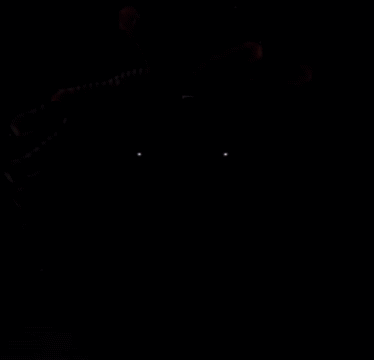
Prev
"Risk"
Sometimes, Harley would look back to the time you would glare at other doctors or workers, he felt a thrill of love for that glare because it was never aiming towards him. On some occasions before you both began courting each other he did receive this infamous gaze and it’d make his skin tingle, from others it made him roll his eyes. You were no different but after a while especially with how emotionally akin you were to the toys; he craved to see it. Anger means a reaction, he has your attention, when it is sadness or indifference the man would feel a wave of disdain: you’re an unreliable narrator to a degree, you blame yourself for everything or you repress the awful things you do. A good example would be the slap with Pierre, or you getting so angry over Quinn, the table was flipped over and left in a huff. He likes that anger, relishes in your rage because it subtly creates a flicker between the two of you. Or it can lead to arguments, or maybe something more sensual.
Hard to explain, when you got angry before you’d angrily hold his hand, and scold the other scientists about treating the toys nicely then look at him for signs of agreement. Of course he agreed at first because he was rewarded, which is where the relationship went wrong, your love is unconditional even in the foundation of his mistakes. It never stops your lips from making contact with his, your hands caressing his face, Harley held a maddening adoration for such affections because it benefits him. Why should he care for how Stella feels towards his actions against you? Unless she was also infatuated with you, no she’s your childhood friend, you both always offer one another yellow roses or tulips. While he wasn’t one for flowers he did seem to find fascination in your reactions, it’s why reliability in narration comes to play. Harley remembers every reaction he deems worthy to remember, yours, the experiments, the workers around him.
You were the unreliable one? No, you both were.. "Because it makes you more sentimental, your bleeding heart is already interrupting my handwork, because that simply means you're having our child, and it most of all means you are being a threat to yourself and this unborn life." You wince at each word, ignoring the rising tears that you blink away. Harley realizes his words and immediately holds you close, “I love you…” He cups your face but then leaves, leaving you behind….again…
Again, did he always fail you? It started with, Prototype he wanted to get your attention even if it affected you negatively. Yarnaby? No, that was his own choice, he needed a bodyguard and that child was the only one who’d listen because of you, “This is for your parents, correct? Our favorite psychologist.” He watches Yarnaby curl up with no thought in his mind besides him, his favorite person. ‘Pathetic’ Harley would think, as if his partner didn’t raise that boy with the mindset of both of them adopting this child.
“Where’s Quinn?”
Damn it! Why are you asking complicated questions!? You set the paperwork down and show Harley some clothes for Quinn, “I bought this for my little boy, haha- our little boy, isn’t it cute?”
How unreliable, you don’t remember this? Harley does, he always will, because it irritated him, grained his soul knowing you were emotionally attached to an experiment. Not that you needed to know, it wasn’t like you were an orphan, right? Sometimes he didn’t realize how little he knew you compared to how much he knew your flaws and bleeding heart, did that make him upset? Compared to how much Stella knew you, yes, it made him wish you had just been some emotionless psychologist who relished in the idea of his success! Is that why you didn’t tell him!? Because he knew but didn’t want to believe it, that you saw him for what he was, an apathetic, self serving, monster? Seeing Leith hug your hunch form while he used the baby against Harley, it was an outrage for the doctor, not because you chose to keep it a secret but because you had every right to yet you told Leith of all people. That selfish, money hungry bastard!
Finally the arguments went off, you both argued and tears were shedding until you angrily yelled. “I wanted a family! I wanted to be a parent with or without you! I wanted to take Quinn away from that hellhole! You lied to me! You said he was safe, and it was my fault that I even trusted you!”
He sucks in his breath at your words to keep from yelling, he had to think of something, anything to get you to understand. “I did this for…myself, it was to protect myself. Quinn…”
“Don’t say his name, I read your notes, I saw those scars on my son, you hurt him you hurt my little boy! How dare you!? You wouldn’t need such protection if you stopped hurting the children and being such a damn fool! That’s all you are, a fool who can’t comprehend the fact that someone would frame you as a monster!” You grab your keys but then stop midway, he was about to perk but only felt his heart sink as you started pressing a couple of ultrasound pictures on his chest. Then with that you leave his house, trying to hide any more tears from falling down, but once the door shuts he grabs the pictures to study them. It was a boy, he felt something for once but also felt maybe this was for the best, he ruined this one chance to simplify what this experiment between himself and you would mean.
It was a failure.
Waking up again, in this body was uncomfortable like always, he felt nothing and something, for you. His lover and his opposite, you had your flaws and knew how to work on them while his flaws exist but why should he acknowledge them!? Every atom in his body was flawed, does this mean that the existence of his very being was never meant to be!? Surely that wasn’t true, not when you loved him enough to even commit to being his partner, even when he wishes to take full blame. You held an amount of it, he wants to say you’re an unreliable narrator because he is the one unreliable, to him Elliot was too soft, Leith was simply greedy and somehow more smart than Harley gave him credit for. But what were you to this Doctor?
Were you, naive, stubborn, softhearted? Or were you aware, alert, protective.
“I see you.”
Harley stops mid thought, his eye widens when you stare him down through the cameras, “Darling!” Your voice was eerie, full of animosity and false tenderness. “Who might I ask, are you?”
You blink, “You do not recognize me?”
“No..”
Harley watches as you stalk towards the camera, “Do I remind you of someone?”
He didn’t have the heart to answer you, it was you of course but he could sense it was a facade, something carrying the anger you had harbored. “Of course.” Harley watches you grab the camera, your eyes now up close so he could get a good look at what he was dealing with.
“Everything you did, it is your fault, but ... .I hold just as much responsibility as you. Whatever pedestal you’re placing me on, erase that from your delusions, you killed Yarnaby, had him tortured just so he could rely on you. Do you understand how heartbreaking it is? No, not at all, it’s okay…”
The camera suddenly begins to static, he blinks as you rip the camera from its station and drop it down the ditch, Doey slips down with a shaky breath. “You alright?”
You nod slowly, a hand covering your mouth to hide the choking sobs that threaten to escape, “No you’re not…” He hugs you close, “I wanted Quill to be mine so bad Doey, I had so many ideas for his school…so many opportunities. I should’ve just stolen him, sometimes in the back of my mind I wish my desire to see the best in Harley had vanished.” Doey nods as you sob sadly, he lets you rub his head and then hug him close. Sometimes he forgot the person before him used to be human, used to be a worker, last time a worker was here they almost killed him. Maybe it was the fact that you were so badly hoping for the best you just inadvertently caused Harley to gain so much power, he remembers the last words Quinn heard before he died…
“Your parent figure would be very proud, Quinn, they’ll adopt you once we finish…” Doey had to watch in horror, the way Quinn so excitedly got ready to move, the way his teeth would hurt him, the abuse the doctors did to him. Then he’d watch in revulsion as Harley comforts Quill, the name Yarnaby rolling off of his tongue every time, as if trying to get a dog to remember its own name.
“Mz….there’s something you need to know.”
Doey turns to you, as the words leave his mouth, it was as if the world had collapsed, and the doughman was stuck holding you back. Your eyes blank, covered with malice as you claw towards the no man’s land danger zone.
So many memories of your babies flashing, Marie, Quinn, Joseph, Kevin! Damn it why were you so naive, Floral speaks this time and your vision cuts to black, ‘I warned you, some things you knew and didn’t know ... .this is something I knew, because I saw him while you slept. You say you love him but it’s misguided, best to let me take over, you’ll only get hurt.’
Poppy rubs your hair back, “What did you tell….what exactly did you say?”
“I told the truth! Doctor Harley shouldn’t get any form of grace, after weeks of us searching, we find our friend, our mother, father, our parent! Mangled, we agreed it would be better for the sake of this haven, what if he manipulates his “lover” then what?”
“I know Doey, but Floral told us it would lead to disengaging, disassociating, what if..”
“Our caretaker will come back, Floral is just taking over.” Poppy nods at Doey’s words, Kissy lays next to your sleeping body so she could keep you warm, even if it was in vain. Dogday and the other critters spoke to each other in hush tones, “....You think…”
“Hoppy, food won’t be scarce for a while but, we shouldn’t…”
“Guys maybe focus on relaxing and finding material, food is on the middle of the list. But I’m worried, I did some research on Floral, they run on emotions yes but…the programming on it is so complex. Bubba..” Bubba shakes his head at Kickin, “Best not to dwell, after all. Machine’s only harvest off of data, not human minds. For all we know Floral could be a sentient AI who simply seeks what our caretaker desires…”
“The Risk to keeping us safe”
Memory data download has begun.
Do you wish to continue?
Yes....correct.
“Floral….” ……
“Floral!”
The robot opens its eyes, blaring alarms fuel the adrenaline rush through the robotic limbs. It falls down, crashing through the glass, before climbing out of the room, screaming throughout the hallways some scientists ran by, and Boxy Boo follows.
Floral hides behind a wall, then watches Boxy Boo, eat, tear, rip the workers until there was nothing but shreds of clothes. Red cells would flood the room had there been more, Floral felt disgust towards the scene, why eat them? They scan the sight….those people weren’t innocent, so Floral shrugs the scene off.
Blood streaming from its mouth will not satiate such lust for flesh, so Floral taps on its own mouth….nothing, everything is blank.
The robot needed to act fast, “Is Stella safe?” The robot thought, as if it wanted to ask but instead it was a mixture. “Kill, eat, save…”
Something is wrong. More blood, bodies piling the sound of a woman’s agonizing scream as bones cracking in the air would erupt throughout people’s bodies. Flora watching as one man crawls over and holds it by the leg, Flora scans him. “Not innocent”
So Floral kicks the male aside, then steps on his hand while a toy drags him back into the darkness, his screams music to the bigger bodies ears…
Higher, higher and latch onto the pipes, the same pipes that would soon clank and clatter was human bodies crash downs Floral catches one of the scientists, he gasps then coughs before croaking out in utter panic. “Dead- All of t-The…Oh god!”
Floral raises a hand then stabs the scientist, setting him down slowly as bait…it tosses this man’s form above. Then crawls along before stalking through the area, “…….” The first one to attack was Mommy Long legs, good. He wasn’t innocent, and yet she lunged at an innocent worker. So Floral swiftly grabs him, running along the floor towards the exit until it was stopped by Huggy, his angry screeching caused Floral to place a hand up like its creator. Upon realizing it couldn’t calm this angry beast, Floral heads for the vents, this man needed to be saved!
……
“yOu cANNot sAvE tHE gUILty…”
it stops as it feels something hit it, dropping the human, it’s body falls…LEDs blank.
The loud crash scares the toys, Floral crawls to safety hiding in the vents, before it lays against the wall. “…..”
What was the main Target….r
Extract the creator if the plan fails
Find the children…..
Save……. save…..
Save who? Why….
its….his….fault
The robot shuts down….
Power off
#ppt harley sawyer#poppy playtime harley x reader#harley sawyer x reader#harley sawyer#harley sawyer poppy playtime#poppy playtime x reader#poppy poppy playtime#poppy playtime#poppy playtime doey#doey the doughman#yarnaby mention#leith pierre mention#kickin chicken#bubba bubbaphant#kissy missy
57 notes
·
View notes
Text
I'm genuinely concerned that iwtv (tv) spells out EXACTLY how Louis is unreliable in his narration, but people spin this into what they think unreliable narration more generally means to them, and not what it means to this narrative. Just to be clear here are the ways Louis IS unreliable (If I happened to have missed something feel free to add):
Louis shows signs of forgetting which are normal in people who've endured long term traumatic events. Any relevant pieces of information forgotten are however righted, and sought to be righted.
Like anyone recounting a personal narrative, Louis states how things occurred from this limited perspective and worldview of the personal. He has a personal idea of himself he'd like to get across, much like anyone. He is not omnipotent. But while most might be fine if the person receiving this story interprets their experiences differently, offering to wider perspective, Louis is often very particular about the ways it must be described fitting how he can already perceive it. Which makes for times of there being a rigid perception of events, where broader narrative introspection could've offered a more truthful telling. Though sometimes this actually keeps it more truthful. This character flaw, if you will, is what Daniel is around to challenge, and he's very successful at it, even when his challenging can push in the wrong directions and draw up the wrong conclusions. Bringing up latent memories, and digging out hard truths Louis has long not admitted. At least hitting on something real, in any case. Meaning, for us, the audience, we are still in relatively reliable hands even with this in play, and so are not actually that off from truth when it is being told by Louis, who is intentionally seeking to tell it, even get it. Merely, our narrative is being, in ways, restricted as to how much is being told, and, outside Louis control, obfuscated in its reliance deliberately. (which we'll return to).
To jump off from this, Louis does withhold. He can sometimes tell Daniel something then never explain or have an answer for it he's willing to say. But we see this most apparently in how the diaries exclude certain events. That he doesn't detail much of his time with Armand, especially sexually, is a more subtle way of this. He withholds narratively to protect others, and respect them and their histories from being exploited. Though in other instances he withholds moreso to protect himself from this, and the image he wishes to present to Daniel and thus the world. One could see the act of presenting he and Armand's relationship as, firstly one where Armand is his servant Rashid, but then one of far more affection than it really holds, at this point in time, as withholding the truth as well. One could go a step further and say he does this to preserve a sense of agency and control over his inner and personal life, not just over the interview, but over this relationship as a whole. In a sense, Louis editorializes because the reality of things is beyond what feels his right to tell, and otherwise be endangering to his sense of self to tell. Louis usage of language is another way he keeps a sense of agency, as he can still pick the words he chooses to describe his life, even if his life has been largely out of his control. He can't in ways tell the full truth without giving up something he's simply unwilling to give.
Related to this, how he defends things, or is defensive of things, portrays a distorted idea of reality, but an honest portrayal of his own perspective on it. Most starkly I'd say is his claim to consider himself not abused.
His complicated feelings, especially about loved ones, give rise contradictory statements about people and events. Where he can claim one thing, and likely claim it from his personal feelings about it, but we are then shown events where this claim doesn't exactly live up to itself in every way, in his or others actions.
However, the main way Louis narrative becomes unreliable is through the lies and distortions manufactured into it and the ways in which the interview is undermined by conflicts of interest in it. Louis story is in fact one containing lies, and active distortions of events/thoughts, beyond normal forgetting, because of Armand's conflict in letting the truth be told. Mind though, that by the end of the story, much like [1] these we can presume have all been corrected for. Or at the very least who this information truly pertains to, Louis, is shown to have no interest in questioning that it hasn't been. What is relevant to have been the full truth has all been said.
There's a bit of a cultural thing influencing the interview. By this I mean Louis and Armand together had created a culture of politeness and respect, which discouraged and fought down getting at the heat of conflict, or emotional and mental vulnerability. Setting aside differences. Leaving things unaddressed, or burying issues, making up quickly, and in incomplete ways, as a means of maintaining a peaceful environment, leads to a level of transactionally met falsehood of how either is portraying themselves, especially in relation to one another, playing into what seems beneficial to them, more than what would be confrontational of the truth between them. Armand offends far more aggressively in this, and one can only guess this comes more from a rearing much more solidified in this kind of culture where there is a multitude of rules around maintaining a facade of 'nice' behavior for a presumed benefit of the group. Whereas, even if Louis follows this in some ways, he is more often seen to push against this, actually. (see; 'acting out')
There was a period (post 2x05 especially) where he makes claims about Armand, with no real way to back them, but for the purpose of continually marking Armand as a traitor. So, making purely emotional claims as opposed to knowing he's getting the facts straight. Discrediting Armand, even if he might be telling the truth. (debatable, of course, but I feel the need to include it anyhow).
The only real thing left of Louis unreliability in our conclusion is some residual effects of his doing where things are then left unanswered, and the information to be found in other peoples perspectives, which Louis isn't held responsible to be knowing about. So it's highly doubtful these are to where Louis is ever to be discredited on his telling of things, more that he just simply can't account for everything without betraying himself, and can't be held responsible to what he simply can not have known, or others controlling his narrative either.
To summarize what this all then means is that Louis is not telling any sort of story, at any point along it, worth discrediting, let alone fully, and wherever he was swaying in that direction, past or presently, it has been corrected for, or at least questioned, to where we can draw all the reliable conclusions on it through inference and sound interpretation. Making what we are left with by the end of season 2 the most reliable version of events of Louis personal perspective, even if quite a good sum of it is still left to this inference. It is because of what is left to inference, and what is something outside the realm of his personal perspective, that makes us the more unreliable sources of determining these events. WE are more likely to be distorting it by this point in the story, than Louis is shown to be. Our judgments, can do more impeding on what ends up being Louis honest account, than Louis ever was.
What Louis unreliability is not, is ever entirely dishonest - is ever one making up events, or turning them into something they were not. Everything we are told is a personal account of things that actually happened. It's certainly not one where, by the end, you can point at anything, and claim there's an irreparable falsehood about it. Perspective on events change, but that they had happened and in a sequential way, does not. One might not like or be satisfied with his point of view, yet this changes nothing. Memory is a monster, but Louis', a monster himself, is still real. These are his true memories as he is remembering them.
Beyond that, the more imperative story told here is the emotional one. On this journey of truth telling, Louis is also relieved of being unreliable about his emotions, and in the conclusion, he's living shamelessly for who he is, past and presently. This opens new doors for his character to exist beyond memory. The interview was a journey of self acceptance, and one's fight for having and reclaiming a self. The true take away, frankly, is that Louis got this, and nothing we can infer and interpret otherwise about his truth, where it is left open, can take this away from him.
I guess this is all to say Louis 'unreliable narration' is actually something he works through, perhaps in its realistic entirely (we are always a little unreliable). It's something that gets righted as a major part of the resolved conflicts that happen over the course of the interviews events, as so we, like Louis, are also resolved of this unreliability if we hold it to that same level of being the truth. And that is also if we are inferring and interpreting things left open properly, which is hard to say, even for Louis. That is where all of that 'unreliability' rests on is the things left open to question still, or gain new perspective on, and not that any one part of what we were presented with is falsely constructed. As we have actually gotten it reconstructed out of that.
#iwtv#interview with the vampire#louis de pointe du lac#amc iwtv#long post#also one where I feel I just reiterate the same thing over and over#made this like on a whim so excuse that#Again feel open to add#putting this in the tags because I spell it out clearly as being for something else (agency) but Louis-#does NOT present himself like he does for the purpose of making himself look better. Or whenever he could be (hard to tell intentions) -#it seems to be for this agency I meantioned. Besides I think it's clear he doesn't really hide his faults deliberately#and when brought to his attention in the interview he does accept them as such almost to a fault#this also plays into whatever this one post was saying (which has always been my thought too) -#that as far as Armand goes he is actually being mostly truthful or we would simply have to say Louis conflict is not actually resolved here#Not just with the events of Paris which Armand is telling but with events after and during the interview deciding they are all false leads#to less of any conclusion actually.#Which would be fine if we were ever likely to return to any of it but I doubt it.#Lestat could confirm things are false or we have to accept what Armand was saying on events is true#which I think if it WAS this is particularly interesting for a variety of reasons
68 notes
·
View notes
Text
Inquisition had a nice thing going with Solas the lore-master, lying only by omission, being an anti-slavery, rebellion-rousing, fade-obsessed princess. As a lore fiend, I want need that Solas back.
Veilguard highlights that a liar manipulator character who is willing to say Anything to achieve their immediate goals cannot be a vehicle for lore reveals. A character who frequently contradicts themselves without some consistent explanation means that we can't trust Anything they say. Fans will be tempted to use this character as evidence by cherry picking some things over other. But that simply confirms any existing beliefs (confirmation bias). As someone who enjoys sleuthing and figuring out how the world works, the more principled way is to discard everything such an untrustworthy character says for what we can observe and confirm with a more reliable source. Basically, if a character is a liar liar pants on fire, then a discerning lore scholar should be equally skeptical of every statement they've made, only trusting ones that can be cross-referenced.
But the problem with Solas is, he is often our only source, e.g. for how the veil works. Because he's the only kne who knows. Because he msde it. And although he was a biased and unreliable narrator, he had a consistent point of view that IS reliable in DAI. Veilguard's rebranding of him as a liar pulls even that fundamental point of reference from beneath us, and doesn't replace it with another one (saying whatever it takes to serve an immediate goal is not a strong enough viewpoint, in fact, it's incredibly effective at obfuscating one's actual views). And that should retroactively call everything he said in Inquisition into question as well. After all, that viewpoint could easily have been made up. We don't have another ancient elf to corroborate most things he's said. We ONLY have Solas's word. And now that his word is completely untrustworthy, then what are we to make of the lore he revealed?
I have heard the argument that Solas is supposed to be different from the one we know in Inquisition. And that intention was executed effectively. He is fundamentally changed (how or why the game never addressed). But it could have been done without destroying the integrity of the lore that we've gotten from him in previous games. But the choice to make him the god of lies made it impossible, particularly in veilguard, where all the other lore reveals also fitted together badly.
And what is the god of lies moniker but the headcanon of Solas haters and detractors who didn't figure out how he operates beyond "he deceived me"? It was a choice to make that interpretation canon, it was a choice to validate and accomodate their beliefs. And why? Solas detractors didn't need it to be canon before, they didn't need it here. Haters gonna hate. It's what they do.
We lost a huge chunk of the fade lore so the game can gratify Solas haters. That's absolutely tragic.
#and this is why I am throwing Veilguard out the 30th floor window from my mind palace#veilguard critical#originally all i wanted to say was that#if you want to believe that solas is a liar liar pants on fire who will say literally anything#then there's no reason to cherry pick one unproven thing he says over another#because he does contradict himself between games and within veilguard and often too#and people ascribe motivations for lying wherever it suits their argument#but no such motivations are given in the text because the text is written badly#and so i choose to discount the rushed badly written text over the well written text#rather than making up headcanons to confirm my existing beliefs from the scraps
83 notes
·
View notes
Text
About Brainwashing in Danganronpa
Hello to all 3 of the people who see this account. A few months ago, I made a thread on hit website Twitter dot com about brainwashing in the Danganronpa Series. I discussed where it came from, how it works, and how the brainwashing of class 77-B was never a retcon. The thread got a lot of attention there, even getting a "debunk" on other hit website Reddit dot com (lmao). Due to that, there's been a lot of responses and questions. Since I can't really update a Twitter thread, I decided that I'd make the Ultimate™ Brainwashing thread and hopefully dispel any information on the subject while making my original points more clear and covering things I failed to cover. So here it is: Brainwashing in Danganronpa, how it works, where it came from, and how it was intended from the start. (a 🧵 except not really) *Massive spoilers for Danganronpa Zero, Danganronpa 2, Danganronpa Another Episode, Danganronpa Togami, and Danganronpa 3, as well as the series as a whole*
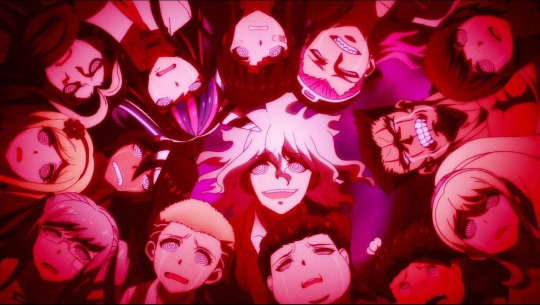
Danganronpa Zero: First Sighting
Brainwashing has its roots all the way back in the second official entry produced in the series, Danganronpa Zero. During the story's events, Ryoko comes across a secret cult made up of students from the reserve course. They're seen staring at a strange video, seemingly turning them and turn them into mindless zombies.
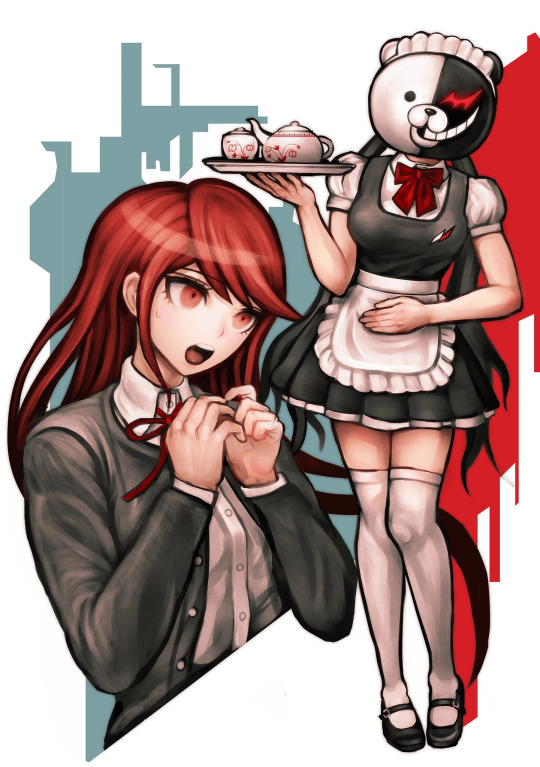

The video depicts members of the student council killing each other. Ryoko is stunned while watching it. She can barely look away, but eventually through force of will she does. This same video is later used to convince the reserve course to rebel.


The way it's described to work is that it uses their “pent-up emotions,” implying that their emotions played a role in its effectiveness. It's also worth noting that the novel itself refers to what is happening as brainwashing, making this objectively the first depiction of brainwashing in the series right from the second entry.
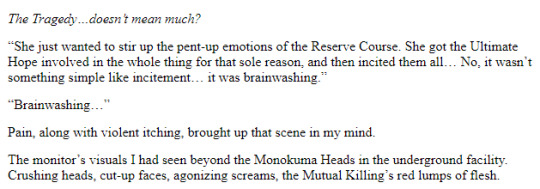
Danganronpa 2: Now it Gets Dubious
Our next instance of brainwashing comes from Danganronpa 2. The concept is brought up multiple times, such as when Makoto states that the Ultimate Despairs were brainwashed or how the Neo World Program is good at treating brainwashing, though the details of what brainwashing actually means in this context are kept vague.
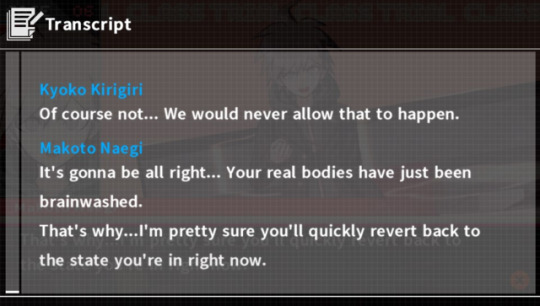
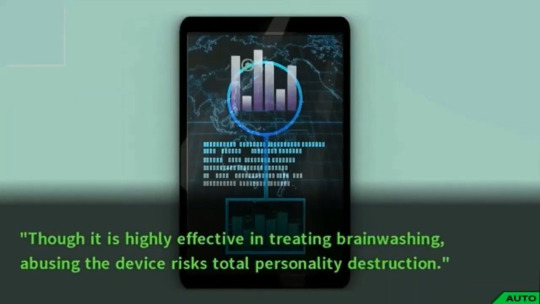
It's also worth noting that Danganronpa 2 was being written around the same time as Danganronpa Zero and Kodaka wanted concepts from the novel to appear in Danganronpa 2, likely so readers would feel validated. This is why things like Izuru Kamukura and the reserve course play huge roles in Danganronpa 2, it's not too much of a stretch to say that the same applies with brainwashing. One detail we’re given about the brainwashing is from Monokuma, who states the Ultimate Despairs were brainwashed by Junko taking advantage of their feelings. Specifically love, hate, grudges, and "anything really". If that sounds familiar, it’s because that’s exactly how the brainwashing video from Danganronpa Zero was described to function, using their pent-up emotions.
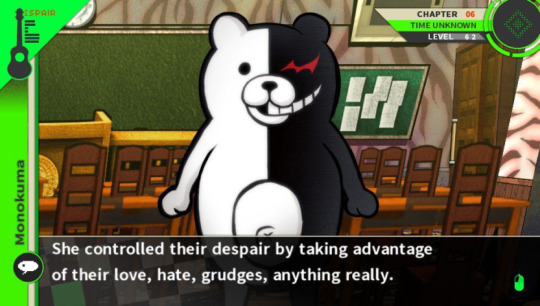
I should mention that Monokuma and Junko are known for being unreliable narrators who often stretch the truth, exaggerate things, and use hyperbole to manipulate people into believing their narrative. Monokuma describes the Ultimate Despairs as “nothing more than Junko’s limbs”, which contradicts the existence of characters like Nagito. Who, while in his despair state, did not work with Junko nor did he look up to her (at least in the normal sense like the other Ultimate Despairs). In fact, it would have been impossible for them to really obey any of Junko's orders as Ultimate Despairs because Junko was trapped inside of Hope's Peak with minimal connection to the outside world. This isn't a definitive "Monokuma is lying" statement, but just note that his word isn't 100% reliable. Meanwhile, someone like Makoto who outright mentions brainwashing, is a much more reliable source.
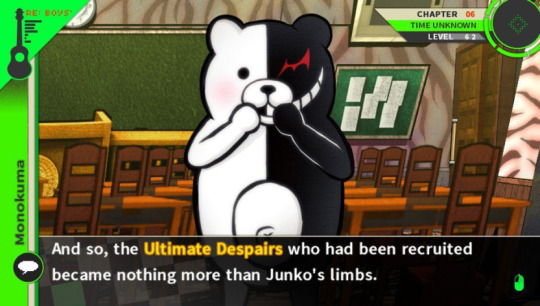
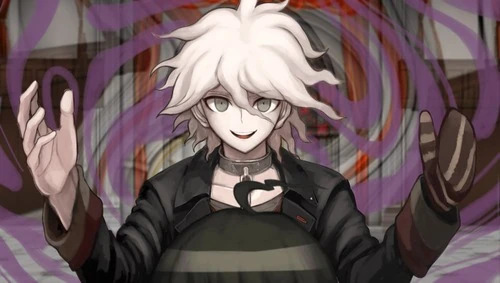
Danganronpa Another Episode: More Brainwashing! (kinda irrelevant tho...)
The next time brainwashing is used is in the next entry, Danganronpa Another Episode. Though its purpose in this discussion isn’t the most useful, as the brainwashing is caused by Monokuma helmets, which don’t have their functionality explained. I figured it was worth mentioning and describing at least, as its another example of brainwashing at least.
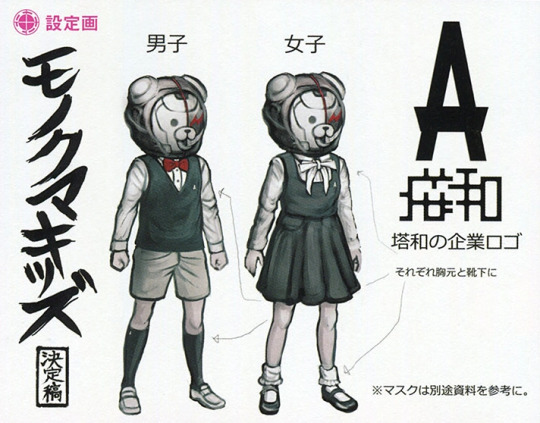
I did figure it was worth adding how the brainwashed children act. They obey the Warriors of Hope’s every command, as if they have zero control over their actions. This is different from how the Ultimate Despairs act, who still some free had free will after presumably being brainwashed judging by the actions of Nagito, who is also in this game.
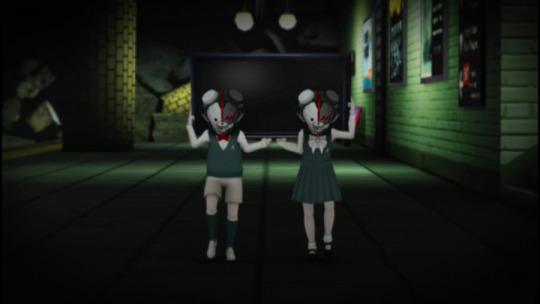
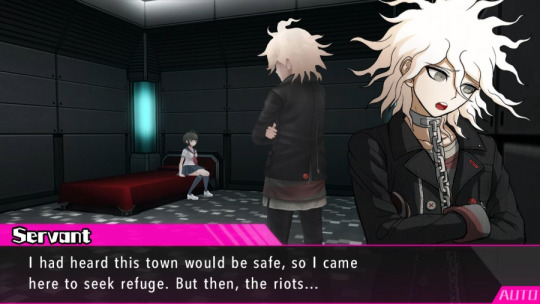
Danganronpa Togami: I Hate My Life
Okay. As mixed as my opinions are on this novel trilogy, it does feature brainwashing. In fact, it might feature one of the most detailed and important descriptions of brainwashing in the series, and even outright CONFIRMS that class 77-B were brainwashed (sorta).

"Hey um... Tumblr/Twitter user Pengu... what do you mean by 'sorta'?" Well my uninformed reader who I guarantee has probably never read this book, there's a twist. I regret to inform you that the canonicity of Danganronpa Togami is rather questionable, as it depicts an extremely unreliable narrator’s warped viewing of events due to this thing called the K2K system, which means not everything in the novel is meant to be taken literally or at face value.
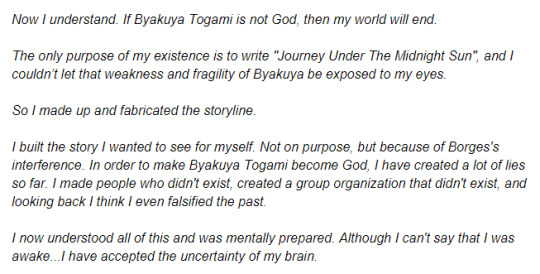
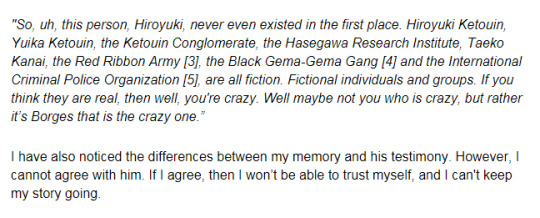
This doesn't mean that everything should be discarded or immediately dismissed however. This just means that we have to use our brains a little and decipher what the hell Yuya Sato was cooking when he wrote this novel trilogy. In the novel, we discover the existence of the elusive despair novel. When read, the novel will turn the reader to despair and inflict them with the despair disease. This novel is what's used to plummet the world into despair, as well as being what caused the class 77-B to become the Ultimate Despairs. There's no known ways to avoid it, once you read it, it's joever. 😔

As I said earlier, the events of Danganronpa Togami can’t be taken literally. Due to this and prior context, we can safely assume that the despair novel is most likely the K2K's warped idea of the despair video from Danganronpa Zero. Instead of being a book being read that brainwashed people, it was a video being watched. What makes me so sure? Well let's look over the similarities. The way the despair novel works is that it uses cruel words to overload the reader with negative emotions, causing them to snap and turn to despair. That sounds almost exactly like the despair video, overloading the viewer by manipulating their emotions until they turn to despair.
However, a major difference comes from the fact that Danganronpa Togami confirms towards the end that the despair novel doesn't literally brainwash people, acting as a placebo and an excuse for people with despair to use.
However I don't believe this suddenly breaks the connection to the despair video in Danganronpa Zero. All it shows is that the novel doesn't create despair, which is something we already established with the brainwashing video. It doesn't make despair, it makes it stronger. Whether it be via the disturbing imagery on the screen or the words on a page giving you an excuse, all it does is amplify despair. Basically it doesn't make despair come out of nowhere, it incites it. This connection's a little bit of a stretch but I'll bring it up anyways. The technology used in the despair novels was originally to bring hope. (Take notes, it will probably be important assuming you buy this connection.)

Essentially, the despair novel works in a similar same way as the despair video, but instead it’s a book and you read it instead of watching it. This means that class 77-B and the rest of the world were most likely brainwashed via the despair video, and that is what caused the class to become Ultimate Despairs.
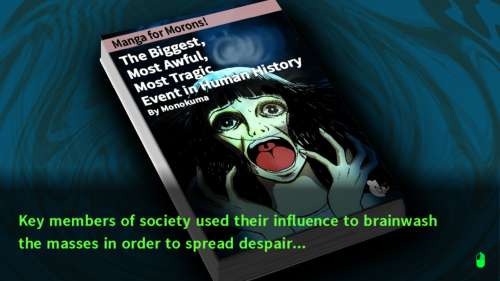
Danganronpa 3: The One People Really Don't Like
And all of this brings us to the most detailed yet controversial usage of brainwashing: Danganronpa 3. Many assume that the anime’s usage of brainwashing is a retcon, contradicting the words of our holy savior Super Danganronpa 2: Goodbye Despair High School. However, I’d like to debate that. In fact, I'd like to finally put a nail in the coffin of this really stupid debate and finally show you that Danganronpa 3's depiction of brainwashing is exactly how it has always been described.
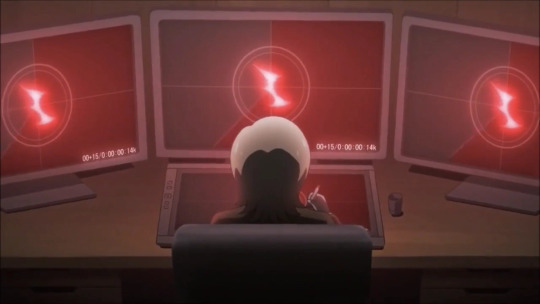
In Danganronpa 3, we are introduced to Ryota Mitarai and his anime. Using the power of subliminal messaging, it heightens the viewer's emotions and makes them more powerful. What was once a slightly emotional scene is now a complete tearjerker fully capable of tearing at the viewers heart strings! While he acknowledges that there are unethical things that can be done with this technology and it's technically brainwashing, his goal is to use this technology to make the world a better place, even if it can be dangerous. If that sounds familiar, that's because it's what Hope's Peak tried doing with the despair novel in Danganronpa Togami. Though I'll admit, this single point is a little bit of a stretch as there are differences. I just figured it was worth at least a mention.
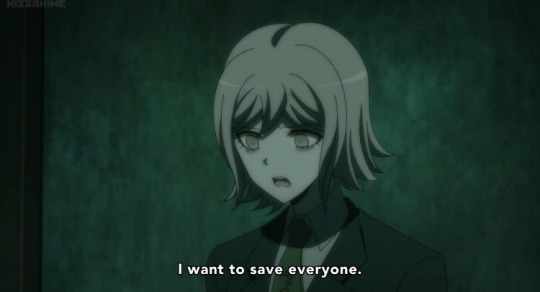
Using her analytical prowess, Junko gets a rough understanding of how the technology works, so she develops the despair video, featuring the student council killing each other overlayed with subliminal messaging technology to make the despair felt while viewing the video stronger.
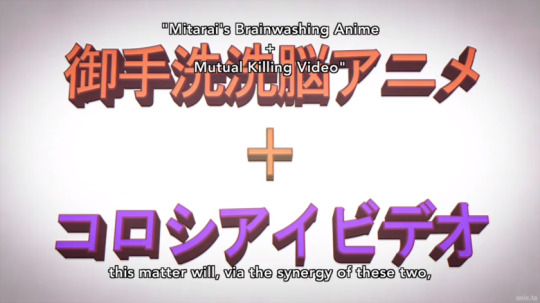
The video works on Mikan, however Junko fears that the video may not be powerful enough to fully go through with her plans due to not understanding the technology nearly as well as Ryota does. Because of this, she forces Ryota to create a better, more powerful despair video. A despair video v2 if you will. Junko’s fears weren’t unfounded, as we discover that Chisa had the mental fortitude to resist the despair video, similarly to how Ryoko was able to resist the same video in Danganronpa Zero. This is exactly why Junko needs a more powerful video, one that she knows can’t be resisted.
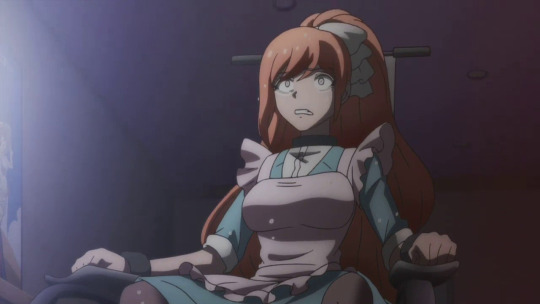
"Ermmmm, Tumblr/Twitter user Pengu, how come Ryoko and Chisa are able to resist the despair video but Mikan and nobody in the reserve course could?" Good question, the answer is pretty simple. As mentioned before, the video takes advantage of the emotions of the viewer. Mikan is already pretty weak minded, so there wasn't much issue in controlling her. The reserve course already hated Hope's Peak and would take any reason to hate them more, so a video that shows them the sins of Hope's Peak would affect them as well. Ryoko and Chisa have no connection to the reserve course however, and neither are particularly very weak emotionally. Ryoko has the analytical prowess of Junko and Chisa is just a very strong willed person in general, and paired with Junko's lack of knowledge about subliminal messaging when creating the video, it's pretty obvious it wouldn't be that effective on them. All the more reason for Junko to force Ryota to make a better despair video.
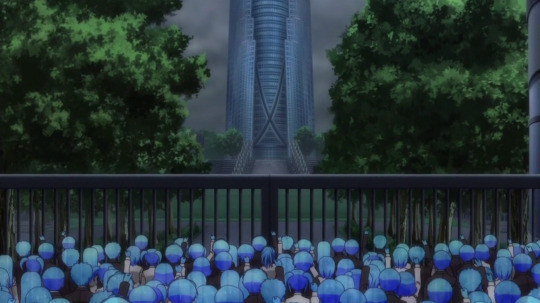
The despair video v2 that Ryota is forced to make comes in the form of Chiaki’s execution video, where the stronger subliminal messages paired with witnessing the representation of the happiest moments in their miserable lives and their closest friend suffer makes class 77-B unable to resist. Ultimately this causes them to finally snap, being overloaded with despair, and now they turn into the Ultimate Despairs. (side note this is so freaking cool idc what anyone else says)
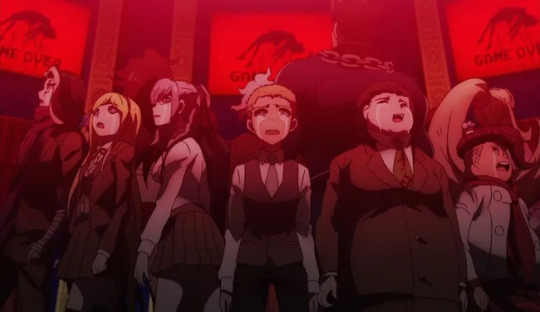
This resembles Monokuma’s explanation from Danganronpa 2. Junko used class 77-B’s emotions and years of getting closer against them to turn them to them to despair. Now featuring the added context of her using the video designed to manipulate people’s emotions. Also as @jelimore pointed out, Junko leading the class to Chiaki's execution itself was manipulating them. This depiction of brainwashing fits perfectly with the information provided throughout the series, even down to the little details. It’s so close in fact that I can say without a doubt that Danganronpa 3 did not retcon anything. “But Tumblr/Twitter user Pengu, that isn’t how the video is shown to work during Hope Arc. Therefore it actually contradicts previous entries and is inconsistent!" To that I say, you’re correct! ...at least about the hope video functioning differently, but that doesn’t make it inconsistent. The hope video behaves pretty differently. Instead of overloading the viewer with negative feelings, it simply just shows them a repeating video loop that turns them into a mindless zombie, likely caused by even stronger subliminal messaging. The people affected can also snap out of this state with some time, as seen with Aoi.
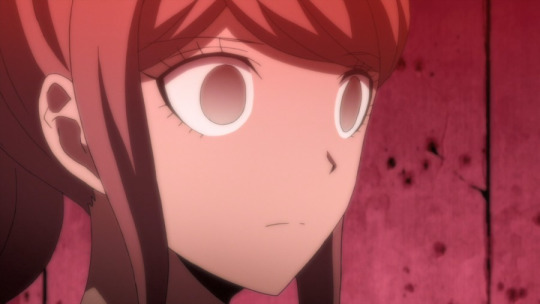
The reasoning for this is actually pretty simple, it’s just different technology entirely. It’s stated that the hope video was developed later on after the despair video. If anything, it behaves very similar to the Monokuma masks from Danganronpa Another Episode, which we also already established uses different technology. The hope video doesn’t contradict the despair video at all because they both use completely different tech. This can also be seen with how the despair video uses subliminal messaging, meanwhile the messaging in the hope video couldn’t be further from subliminal. There is no inconsistency, just two different things.
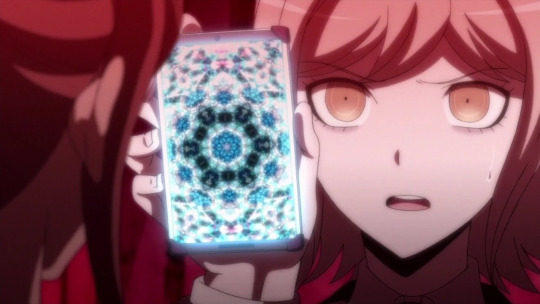
The reason the hope video needed to be broadcasted everywhere was so that since it would be airing everywhere, nobody would have time for the effects to wear off or resist it. This would turn the world into mindless zombies who obey every command, similarly to the Monokuma kids. It's just that now they don't have to force bulky helmets onto everyone.
Debunking Common Arguments
With the hope video out of the way, I think it’s very safe to assume that not only is the despair video’s functionality very accurate to previous descriptions, it’s also always been the reason for the brainwashing of Class 77-B, long before Danganronpa 3. Even if you disagree and think the cause of brainwashing was never explicitly mentioned in Danganronpa 2, there's still the fact that Danganronpa 2 outright says it was brainwashing. So even if a video wasn't the direct cause of it, them being brainwashed was still always intended (though given the context and the fact the video was introduced in a tie in novel for the game, I'm certain that it was always the culprit). Many point to this line where Kazuichi asks why they became the Ultimate Despairs and Makoto says he never got an answer to debunk this. But... this doesn't change anything. He asks why they became Ultimate Despairs, not how. And this is completely ignoring the fact that Makoto clearly has done his own digging into the situation, he discovered the Remnants of Despair were hiding among Future Foundation after all. The Future Foundation had access to brainwashing videos, they found them, so of course Makoto is going to know about the brainwashing. What Makoto is saying here is that he doesn't know every little detail, all he knows is that they were brainwashed. I wrote a bit more about it here, but there's nothing contradictory in this scene.
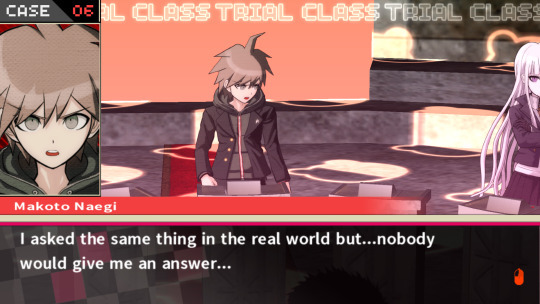
Many also point to Mikan stating that it was her many human relationships that led her to being the way she is. Once again, this changes literally nothing. Mikan was the only one of the remnants who actually knew Junko, she was the only one who spent time with her because she was the first subject. This is why she gets more attached to her, and even why she'd believe what Junko would tell her when they spent time together. Monokuma also says that Junko used "hopeless methods overflowing with charisma and humor" to control the masses. I don't even know why I have to address this, but this statement is so vague you can interpret it as a million things. Like for example, this is how she got Ryota to work for her. While pretending to be Makoto to manipulate the people in the trial, Junko tells them that they all became Ultimate Despairs while coming into contact with her at Hope's Peak and they were subjected by her terrifying influence. Again, ignoring how vague "terrifying influence" is, this is literally Junko trying to LIE AND MANIPULATE them. This is quite possibly the worst example you could have used because we know for a fact that she is lying to them while pretending to be Makoto. There's other examples of Junko trying to manipulate them, like mentioning how everyone hated them and their all Ultimate Despairs at the end of the day. But that's just what this is, manipulation. You would think that the "Junko manipulated class 77-B" crowd would understand that saying "everyone hates you but I saw your potential" is literally manipulation 101. She even states that Izuru killed the entirety of a student council, which we know for certain is a lie because Danganronpa Zero (which came out before) says otherwise. Some say that the brainwashing turned them into mindless zombies and eliminates all blame from their actions. While I would agree that it does make them less at fault, they still have the ability to make choices and still have free will. Their original personalities haven't been overwritten, their brains were just rewired to crave despair. They're still each their individual person with their own ways of feeling despair, and characters like Chisa and Nagito show that they regain their free will to an extent. I also wrote more about that here, LOL.
Conclusion and Final Thoughts
This whole debate stems from people misunderstanding Monokuma’s words and going along with the popular interpretation, which turned out to be wrong. Whether you like the use of brainwashing or not, it objectively isn’t a retcon as it's been developed ever since Danganronpa Zero. Personally, I love the use of brainwashing. I think the way it's developed throughout the series and its usage in Danganronpa 3 is super interesting. If you disagree, that's fine! Heck, if you choose to headcanon that Junko manipulated 15 individual teenagers into all becoming despair hungry terrorists capable but ending the world and fighting off every military in the world in less than a year, that's cool too! But the truth is, Danganronpa 3's brainwashing is canon and it's also not a retcon nor does it contradict anything. Contrary to popular belief, Kodaka was involved with the writing of the anime. He provided a large draft and outline of the plot and oversaw its development. He produced the anime, he did his homework, the team even played the games to prepare for writing the anime. He knew what he was doing. I'm sure if Kodaka intended for them to all be manipulated one by one, that's what he would have went with. All information implying that it was manipulation is very few and far between and questionable at best, not to mention outweighed by everything implying it was brainwashing. Mind manipulation stuff is not new in this series, its been around since the first game and brainwashing was established in literally the second entry ever produced. Whether you love it or hate it, think it's the best thing since sliced bread or the death of the series, brainwashing was the answer the whole time. Some people just never noticed it, and instead of acknowledging that they were wrong, they stuck with a headcanon that they believed so much and jumped to the conclusion of "retcon". I hope this mega post managed to inform some people, maybe change some minds too. If you still don't buy it, then I guess there's nothing I can do. Thanks for reading all of this though, I tend to yap a lot about this franchise lmao.
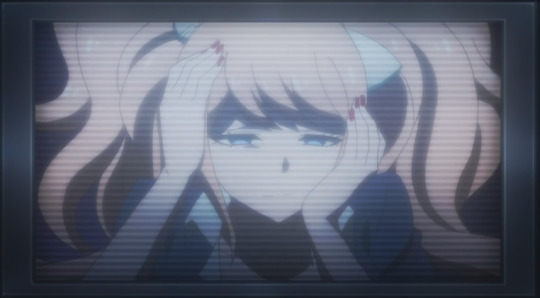
#danganronpa#danganronpa 2#danganronpa zero#danganronpa 3#dr0#dr3#dr3 anime#danganronpa goodbye despair#danganronpa 3 despair arc#dr2 goodbye despair#super danganronpa 2#danganronpa anime#sdr2#danganronpa another episode#danganronpa ultra despair girls#udg#danganronpa togami#danganronpa analysis#ultimate despair#remnants of despair#junko enoshima#ryoko otonashi#chisa yukizome#ryota mitarai
401 notes
·
View notes
Text
Rating: General Audiences
Relationship: Siffrin & Everyone
Characters: Siffrin, Isabeau, Odile, Mirabelle, Bonnie
Additional Tags: in fast and food, fast food au, oh yeah give it up for the au i made to cope with capitalism and also that one april fools post, bonnie and nille are orphans, misunderstandings, self worth issues, the anxiety of making friends unless you are useful to them, i would love for isa and sif to be dating but you cant just ask someone out at their job, siffrin making bad decisions that turned out well, mirabelle calling out siffrin. you go girl, POV second person, unreliable narrator, its siffrin how reliable can you expect them to be, setting is not france or france-adjacent because i never worked there, oh but i could wish upon a star
Summary:
The best part of any job Siffrin has had, will have, and currently has, will be the people they get to feel some sort of connection with. Even when that connection is inevitably severed. Even if he can barely remember any friends he's had in previous towns they've moved on from. Even when they're.. not really friends, are they? They're just coworkers.
#in fast and food#isat#in stars and time#fanfiction#ao3#i cant believe of all the things i could have written. it was this self indulgent au#i just had so many ideas piling on top of each other i was like#my god for once writing something is gonna be easier than drawing a billion things for it#siffrin isat#bonnie isat#mirabelle isat#isabeau isat#odile isat#writing#i hope someone gets enjoyment out of this one because i sure did#time to scroll youtube and social media endlessly
110 notes
·
View notes
Text
My gripes about the characterisation of yoo joonghyuk and the changing of particular lines aside I quite like the manhwa personally - the art is great, the fight scenes are amazing and the comedy works well - but I honestly think there are some things about the story that will never be properly communicated in comic form. Of course there's always content that will be lost when converting between mediums because that's how adaptations work after all. However, where the orv novel works so well is that it utilises its medium in order to delve into the nature and intricacies of stories and storytelling as a whole. The most obvious example of this is the main concept of orv - being a novel about a reader reading a novel - but it's also important to note how the form and structure of the narrative contribute to this as well. The orv novel primarily uses first person to not only to allow us to feel more connected with kim dokja's character, but to also have us see the world around him through his own eyes, experiences and biases, particularly earlier on. As a result of this, there is a subjective element to the narrative that allows for dokja to be more of an unreliable narrator and us as the readers to have the freedom to interpret or imagine the novel as we wish. Where the manhwa struggles to adapt its source material, in my opinion, is that it inherently portrays the events of the story a lot more objectively due to it being a visual medium. Rather than seeing orv through the first person lens of kim dokja, it is presented to us as third-person observers. A lot of the detail and nuance that comes from the contrast between his perspective and the small glimpses we get into the other characters' minds is unable to be fully conveyed. Kim dokja feels more reliable as a character because it is comparatively difficult for the manhwa to convey his own views and biases that apply to both himself and the people around him. We have less freedom as the readers to make our own interpretation and this is why we often find ourselves disappointed with the way specific scenes and characters are visualised. I love sleepy-c's work but as a whole I end up finding myself wondering how the manhwa is going to tackle the more subjective aspects and themes of the novel later on.
#just some of my thoughts regarding the manhwa#omniscient reader's viewpoint#omniscent reader#kim dokja#orv manhwa#orv novel#yoo joonghyuk#orv#no outright spoilers here
67 notes
·
View notes
Note
I’ve been feeling really sad lately bc after this latest rise in anti transmasc sentiment I’ve had to unfollow some trans women I’ve been following for literal years bc they started reblogging and posting really nasty and very uncharitable things abt transmascs on my feed. And like. These are women whose voices I very much respected and listened to, and to hear them basically say they consider me an enemy who can’t be trusted bc I want to talk about my experiences, but all of our issues are really just splash damage from bigotry directed at them and talking abt my own experiences without acknowlefing that it’s not really meant for me is wrong. It’s like. So hurtful. And it makes me feel really hopeless about the future of the trans community.
How do I fight back against that hopelessness?
it really sucks and i'm sorry you're also being affected by this. i hear people talk about this every single day and i really don't like that this is just becoming a default in the trans community in general. it seems like the default mode of most online queers is hating transmascs and trans men as if that will somehow make cishet society accept them more. it's selfish behavior.
i'm an intersex trans woman and it's hard for me to interact with the online transfem and trans woman communities, because we're seeing a new experience in the form of transradfeminism, where trans women proudly adopt the anti-man ideals from rad feminism and spread it like it's the truth. it's a sad and painful thing to say, but these trans women are doing this because they believe rad fems and women who hate men are the only "Real" women and desperately want to be seen as "real" women. it stems from their personal dysphoria rooted in manhood, how they take out their own dysphoria in being seen as men on men and mascs. it comes from a place of pain, and it is misguided. instead of directing their hatred toward transmisogyny, they keep it inside the community. it's vile.
it's really sad but trans women and transfems are not immune to being indoctrinated by rad fems and terfs. applying those ideals to being trans isn't progressive. dictating who is and isn't trans is an act of policing. feeling as though one has the right to sit there and claim to know every trans experience, claiming to be the authority on transness... it's fascism.
i'm just plain tired of hearing people make fun of afab trans people and trans men and to talk about them like they're a blight on the community. im tired of people saying things like "do we really need more men?" i'm really sick and tired of chronically online people saying that trans men "aren't real trans people". this one really pisses me off. implying that trans womanhood and transfemininity are the only "real" ways to be trans is also identity policing. what is "unreal" about trans men? i'm tired of trans men being treated like they're unreliable. i'm tired of people wearing their misogyny on their sleeve to constantly treat trans men like they are not reliable narrators. i'm tired of people thinking somehow the instant you begin identifying as a man, you benefit from patriarchy.
i'm tired that people seriously think trans men and mascs can't coin terms for their own experiences. why the hell not? they happen, just because you don't see them personally doesn't mean they don't happen. i have met and lived with so many transmascs over the years, and we've all shared very similar stories about the discrimination we face. it's not spitting in the face of anyone to coin terms like transandrophobia and antimasculism. they happen just as often as transmisogyny does, and happily participating in it only increases trans violence
these talking points are old and it sucks to see more and more trans women get indoctrinated into literal rad feminism. hating trans men will not make dysphoria around being seen as a man go away. hating trans men does not dismantle the patriarchy. hating afab people isn't progressive, it's misogynistic. hating intersex trans men isn't progressive, it's transphobic -and- intersexist. trans men deserve so much better than this. trans men are trans. trans men are people. trans men are not evil by virtue of existing
i say try to do your best to connect with and appreciate the other trans men and mascs in your life. we have to stick together. if you have transfem friends who are on your side, make sure to be there for them, too. not every trans woman is like this fortunately, most trans women are very chill about trans manhood. this is a vocal minority of people who want to be fascists and want to control and police other trans people. transradfeminism isn't progressive, it's just as bad as regular rad feminism, if not worse, because now there's an even bigger focus on hating trans people.
hating other trans people will never get you ahead in cisheteronormative society. try to take care of yourself as best as you can. really relish trans joy when you experience it. take time to affirm your gender. know that manhood is a blessing. manhood is beautiful. it is varied, nuanced, and complex. it is a wonderful thing to experience. men are not evil. men are not bad. we should never remove the accountability from individuals.
hating trans men makes you transphobic. there's just no other way to it. whether or not you accept that it's called transandrophobia, it is still transphobia, and you really should care. the trans community isn't here for just 1 type of trans person. it's here for all of us. good luck, stay safe out there. be good to yourself
436 notes
·
View notes
Text
MXTX the unreliable narrator vs. her unreliable protagonists
One of the things MXTX does so well is to blur the line between narrator and internal monologue. Scum Villain is almost entirely written from SQQ's POV, and we know that he is a classic unreliable protagonist. But it's not 100% true that SVSSS is entirely from SQQ's POV. There are several places where the book goes head-hopping and we get other people's internal monologues. Since this isn't signaled or called out in any way, it leaves the reader without real clarity about what is narrator and what is POV. One example comes quite early on, when the young LBH fights a series of duels with the demons during their invasion of Cang Qiong Mountain. We briefly get the POV of his combatants. This may just be a sign of MXTX's imperfect command of her form (she wrote the book when she was in high school ffs), or it may be deliberate.
Either way, this squishiness means that the reader can't be sure that there is no omniscient narrator who is suppressing or providing info that SQQ might not have. In addition, we have the System's interference in the novel, which is not exactly omniscient narrator, and not POV character either. And then there's SQQ's own tendency to lie to himself. He is unreliable not only because he neglects to mention certain things, but also because he is so un-self-aware that he doesn't know some things even from inside his own POV.
[Later, in Heaven Official's Blessing, MXTX wields the tools of narrator omniscience and narrator omission much more smoothly. We get a narrator who seems to be confidently omniscient and honest. Yet we can see - only on reread - how much salient info is omitted at crucial points. Exactly what happened in the past. Exactly why Xie Lian ascended. Exactly who Hua Cheng is. And then we have the unreliable Xie Lian, in whose POV most of the book is given. XL isn't unreliable because he lies (he doesn't lie); nor because he's ignorant or unself-aware (he is neither); but because he prefers not to tell anyone - including us - more than he needs to. He's very private, and he plays his cards close to his chest. He has a wicked sense of humor, but enjoys himself entirely in private and alone.]
So in SVSSS the line isn't necessarily a clear one. Further, the confusion on the part of the reader may not be a mistake or misreading - it may be provoked deliberately by MXTX. That's because in the greater scheme of the book, MXTX is intentionally putting us in the same role with respect to SVSSS that SQQ has with respect to Proud Immortal Demon Way. That is: we have our preferences about the protagonists and antagonists and our opinions about the quality of the writing, the inclusion of episodes for reasons not required by the plot (starting with the introduction of the System as a character in the book, separate from The Narrator, and separate again from MXTX).
That said, some readers do misread or interpret in ways that the text doesn't really support. But they're allowed to do that because the book is so deliberately confusing, and because the theme of the book is Fandom and its quixotic relationship with the Text.
It's an incredibly layered and complicated setup.
One thing I've noticed about MXTX readers (and maybe Danmei readers in general) is that they fall in love with the version of the book they like and want, and then tend to read through that lens. This may mean taking info as "fact" when it's really just the opinion of the POV character, and not reliable.
Which of course is Shen Yuan's problem with respect to PIDW in the first place. MXTX is amazingly savvy about her readers and not shy about parodying us too.
EDIT: I realize that I need to credit @gaywatch 's reading streams on YT of MXTX books for the starting points for my various meta thoughts. So much insight stuck in the middle of hilarious and delightful deconstructed and subverted versions of audiobooks. https://www.youtube.com/@Gaywatch
#svsss meta#svsss#tgcf meta#mxtx's relationship with her readers#danmei tropes#MXTX unreliable narrator#omniscient narrator
38 notes
·
View notes
Text
Umineko Episode 2 Blog: Deep Blue

I'm far prouder of the title of this post than I have any right to be.
I thought Episode 1 was convoluted, but after reading all of Episode 2 I look back with fondness on those days before I watched Kanon get into a lightsaber duel with a goat.
But before we talk about how this game has jumped the shark, we're going to the aquarium to hear about some spoiled kids fumbling dates with people who are paid to hang out with them, and to meet our latest reliably unreliable narrator.
George is the most eye roll inducing character I've read in a long time. I'm ratcheting between "how are you this naive?" and "what is wrong with you?" and "you're kind of a nice guy when you get down to it" every time he opens his mouth. He genuinely buys in to the whole sappy romantic narrative he's constructed, to an extent that's almost pitiable, but it's ultimately self-serving.
The relationship isn't entirely horrible for Shannon: if nothing else it's finally motivated her to reject her "furniture" cult programming, but being George's wife is not a healthy foundation for her entire sense of personhood, and the cracks begin to show when George's inner monologue talks about how he enjoys her emotional vulnerability because it lets him feel in control, or when he accidentally admits that he didn't care much for Shannon until she became attractive enough to catch his eye. There's also something innately uncomfortable about how close Shannon's supposed virtues as a potential wife are to her values as a servant. She doesn't speak up and she does all the cooking and cleaning and she'll worship the ground George walks on for treating her with the bare minimum respect any human being would receive.
It's certainly doing a better job of subverting and commenting on this character archetype than Episode 1 did by having Battler assault her.
Ryukishi made sure to give us something to chew on in this lunch date by using their conversation to establish some important themes.
We've got their conversation about the aquarium tank being like a whole world to fish living inside of it, paralleling Rokkenjima being cut off from the rest of reality and essentially becoming its own little world, observed by the witches. It's harkening back to the advice Bernkastel gave us earlier: Rokkenjima is a game board, on which a game is played with very different rules to our ordinary reality, and understanding the rules is the key to beating Beatrice. In other words, we're doing a bit of a Danganronpa where each game deliberately follows the same formulaic beats, except Umineko actively wants us to metagame the formula to figure out what's going on. We also get George's narration reinforcing the idea by talking about the two of them being in their own little world on their date, which is the sort of elegant weaving in of theme that I like to see when I'm reading.
Shannon is also about to elaborate on a recurring line about the sea appearing blue or grey depending on your perspective but then George goes ahead and talks over her.

Thanks for that, George.
I want to skip ahead to Jessica's date with Kanon, where we see the opposite end of the spectrum for a relationship like this. Where George and Shannon's relationship is fairly well-established but can't escape from the master-servant dynamic, Jessica and Kanon never really get off the ground. I might even go so far as saying that there's something vaguely incestuous about their relationship: they live together, have a pre-established relationship with expectations that conflict with the new kind of relationship they want to have, they are mutually the only boy/girl around their age who is really available to them, and one of them is sort of coercing the other into it (it is interesting to note that the girls at Jessica's school see Kanon as a kid). It was never going to end well, and the ensuing blow-up makes day to day life more complicated for everyone.
We get a return to Shannon's thoughts about how much larger the world is beyond what she sees stuck on Rokkenjima. High school is a foreign land to Kanon, and it's marked not only by a change in scenery but by a shift in genre. We see Jessica reprimanding her friends with the use of brass knuckles, an item that it seems unlikely she could reasonably acquire, let alone get away with using to assault other students. Umineko has established expectations for how and why it breaks from reality, and this is very much not within those expectations, to say nothing of the jarring and anachronistic scene of Jessica cosplaying and performing a Touhou doujin song while Nico Nico Douga comments fly across the scene. This makes absolutely no sense in Umineko, but it makes perfect sense in a high school slice of life comedy anime. It's not just Rokkenjima: Jessica's school is also an enclosed space with its own rules which may diverge from normal reality.

The funny thing is, she still looks less stupid than Kanon does in that coat.

I don't care how many people Shannon killed. This is her worst crime.
I wonder if Ryukishi was going for an intentional commentary on classism by waiting this long to show us the perspective of one of the servants. The "furniture" thing has gone from a weird quirk with some unsettling implications to being a full-on death cult, with the whole eschatological narrative surrounding the Golden Land serving as the carrot to the stick of whatever punishment the family thinks up this week.
All of this culminates in Jessica's monologue about personas. Jessie helps Jessica by acting out the desires she doesn't get to act on normally, and she suggests that Kanon should try doing the same. This establishes an important motif for the entire Episode: alter egos. They're all over the place.
Kanon's real name and his rejection of it keeps getting flagged as important. I wonder if it's a red herring or if his name is actually going to be a huge twist in itself. It would be convenient for me if it turned out his real name was "Beatrice."
Jessica, of course, has her Jessie persona.
Shannon is furniture, but she is also a human
The Halloween motif, which I think is implied to be the result of Lambdadelta's influence somehow? That'll be interesting to examine later. The discussion of the appeal of Halloween costumes echoes Jessica's words on personas.
Maria is once again switching between her human self and her witch self. We heard George's thoughts on this back in Episode 1, where he concludes that this habit reflects a desire to project a version of herself who's strong, smart and special.
Maria describes her mother as switching between her normal self and an evil witch, which Rosa is always quick to agree to. Mother of the year. We're going to have to talk about her whole deal after that Tea Party, aren't we?
I've talked around it long enough. In-between all the romantic hijinks we got possibly the most important scene in the episode, in which we meet our narrator for Episode 2: Sayo. We see her smashing the mirror at the old torii shrine, monologuing about the need to escape from her current life, the miracle that she'll need to achieve it, and describing the mirror as the "key" to this miracle. "Key" is one of our epitaph buzzwords, so any time it gets used as a metaphor piques my interest, although I don't have all that much to say about it here and now.
We also have that whole "without love, it cannot be "seen"" thing, which will definitely be important, considering that "seen" has been placed in quotes, the same way that references to people "seeing" the witch or the witch "existing" are always written.
I called the narrator Sayo because, reflecting the alter ego motif, Sayo has this troublesome quirk where she thinks of Shannon as a different person, and describes her as such, giving the illusion of a 3rd person narrator, since Sayo very rarely breaks character. Luckily, the story is quite quick to make it clear that Sayo is still the narrator, even after her scene at the torii shrine:




I have no idea where Sayo found all the shonen manga she obviously read to come up with this Episode, but knowing that we're hearing this stuff from her will give us some leverage to avoid having to acknowledge the witch's existence.
That's all for now. I was hoping to write less posts for this episode, since I felt my interest waning a bit during the writing of the Episode 1 blog and some of those posts in hindsight didn't need to be written or could have been combined with others (especially "the lying detective?" which I'm considering just deleting). A lot of crazy stuff happens in Episode 2, but at the same time significant chunks of it are almost completely nonsensical, which is of course all part of the witch's scheme. We'll see how it goes.
Next time I'll probably either dive into the appearance of Beatrice in the flesh, or talk a bit about the Red Truth and the whole game being played between meta-Battler and meta-Beatrice. I do hope this doesn't turn into a Yu-Gi-Oh thing where I have to distinguish between 3 different versions of the same character.
#liveblogging#umineko#umineko liveblog#umineko no naku koro ni#umineko when they cry#umineko episode 2
25 notes
·
View notes
Text
2024 Book Review #70 – Absolution by Jeff Vandermeer
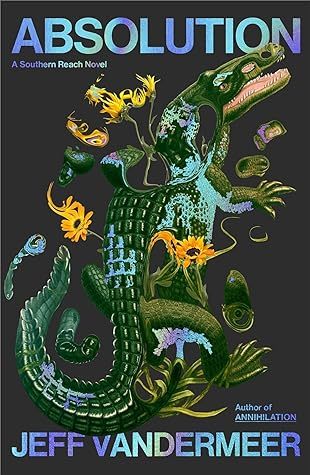
New additions to a series a decade after it concluded don’t have a particularly good track record at living up to the quality of the originals – far too often they just read as commentaries on the series’ fanbase or pop culture reception, and that’s if they escape being a transparent case of giving the fans slop for a quick paycheck. This is even more the case when the originals are a tightly interconnected trilogy with an extremely definitive conclusion.
All to say, I received the news that Jeff Vandermeer was writing a new Southern Reach book with a mixture of excitement and trepidation. Excitement, because Annihilation might actually be one of my favorite works of the 21st century and the whole trilogy holds a deeply and irrationally precious space in my heart. Trepidation because – well everything I just said. Thankfully, this was far more good than bad – not Annihilation, and it didn’t need to be basically as long as the entire original trilogy combined, but absolutely met my expectations of beautifully described cosmic and psychological horror and indecipherable mindfucks in gorgeously uncanny locales.
The book’s a hard one to describe – the plot is twisting and opaque, the narrators thoroughly unreliable – but it’s (not exactly but nearly) a prequel to the original Southern Reach Trilogy, following first events in the Forgotten Coast in the lead-up to the Border falling, and then the very first expedition sent across it into the newly-named Area X in the months after. Though it’s really divided into three-ish parts rather than two – first we get a vivid picture of Old Jim (our first POV) recovering from his life collapsing into a gutter and researching the confused and redacted records of a very Cold War CIA science experiment on the Coast years prior and how it all went horribly wrong, before journeying to the Coast himself in the weeks and days before it becomes Area X to try and discover what happened. Exactly one character from this section also shows up on page in part 3, though the neither the reader nor the new POV is aware of her continuity until quite late in the game. Which is funny, given that despite neither protagonist ever really understanding her, Cass has the most complete character arc of anyone in the whole book.
This is a book very concerned with language and perception – how you can’t trust them, how they can control you, how the right words whispered in your ear can shatter everything you ever were. Language is a parasite that needs a host; the song stuck in your head reinforces the compulsions you don’t even realize you’re obeying. The theme runs thick through the entire book, and shows up more ways than I can count. I did particularly like how it’s specifically the beautiful things – the poetry, music and cryptic little koans, the fields of wildflowers and the awe-inspiring autumn storm – that are the dangers, that might entrap and break you. Even the protagonists’ internal monologues shift as their minds become more and more captured by whatever motive force drives Area X, their descriptions and use of imagery more elevated and poetic as they get further from whatever humanity is.
Not that Area X is the sole source of identity-rupturing and mind-stealing horror, here. Old Jim and Lowry are both agents of Central, the opaque intelligence agency that control the Southern Reach in the original trilogy. Both have been broken and remade by it, their minds stuffed to bursting with hypnotic conditioning and trigger words in case they ever get distracted or prove to be unreliable. Not that anyone seems clear on who they would even be reliable to – the whole agency is addicted to secrecy, its internal factions feuding and sabotaging each other in the shadows, the chain of command a complete mystery to anyone not sitting at the top of it. Just like Area X, it’s never even close to clear whether the things encountered are the outwards signs of some grand and intricate conspiracy, or just the random flailing of a blind idiot god.
Vandermeer has at this point made a very specific aesthetic of horror almost his brand, and it shows up here in spades – the uncanny intersection and overlap of nature and civilization, overgrown ruins and artificial facsimiles or animals, the overwhelming of ordered systems and bureaucratic rationality with the bizarre and inexplicable, the usurpation of body, mind and world by something foreign to it. This is a book whose acknowledgements section is at least half different specific sorts of ecologist or similar experts being thanks for things like ‘detailed information on how a gar would feel in the hands like a rifle,’ and ‘how it would feel to have an alligator gush through the mud around you if you were lying mud-bound in a blackened meadow.’ Which I always find just incredibly endearing (along with the acknowledgement for an idea as being from a literary critique essay of the themes in the original trilogy – which is getting a bit incestuous, but it was a good bit of imagery.)
As always, some parts of this is going to work much better than others – the rabbits with the odd cameras around their necks, placidly digging for and eating crab meat while a flamethrower is unloading on them particularly stuck with me, whereas given the sheer wordcount spent on it I don’t think the Tyrant (or any of the alligators tbh) had nearly the effect on me the book hoped they would.
Overall though, it worked. Vandermeer’s prose is laid on more than a little thick at points, but there are several different bits of imagery or turns of phrase that have stuck with me – that feel downright inspirational to try and make something that can achieve the same effect, even. I do feel like the impact of Area X is weakened by the fact the total absence of really normal seeming people – even before the border falls, we only barely meet a single person not already captured in the whole labyrinth of conspiracies, hypnotism and psychosis – but that is in fact kind of a plot point here, so.
As far as recommendations go – this book is totally incomprehensible if you haven’t read the original trilogy. Also not as good as Annihilation. Go read that and then decide if you want to continue – but the series remains one of the leading examples of 21st century cosmic horror that’s trying to be something besides a riff on Lovecraft.
38 notes
·
View notes
Text
Love in the Big City Book Club Meta Round Up
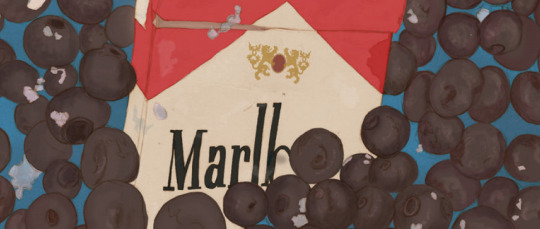
Already so many great essays and we’re just getting started! If you haven’t had the chance to read and share everyone’s thoughts, here is your weekly round up. Any additional essays that post after today will be added to the list next week, and I'll add on a new section for each part every week as we progress.
So let's see what our book clubbers had to say!
Background
AMA with Anton Hur, LITBC Translator
Translator’s note by @stuffnonsenseandotherthings
Part 1
Blueberries and Cigarettes: Universalities and Differences when reading Love in the Big City by @brifrischu
Jaehee: a good distraction–until she wasn’t by @serfergs
LITBC: Jaehee, and why she matters so much to me by @starryalpacasstuff
LitBC Part 1 – Timeline by @dylogpenchester
Love in the Big City Book Club: Part 1 by @fiction-is-queer
Love in the Big City: Reflections on Part 1 by @becomingabeing
Love in the Big City Part 1 Check in by @bengiyo
Love in the Big City, Part 1 by @emotionallychargedtowel
Love in the Big City Part 1: Jaehee by @sorry-bonebag
Love in the Big City Part 1: On Friendship by @lurkingshan
Love in the Big City Part 1: Reliable and Unreliable Narration by @twig-tea
On expectations by @hyeoni-comb
Part I: The unacknowledged relationship by @doyou000me
Rose Reads Love in the Big City by @my-rose-tinted-glasses
Two Friends Diverged in Emotional Sincerity: Reflections on Love in the Big City–Part 1 by @wen-kexing-apologist
Young’s world is small and private by @colourme-feral
Part 2
Finding Familiarity Despite Cultural Differences: Love in the Big City Part 2 by @fiction-is-queer
Hyung’s internalized homophobia and hatred for the US by @stuffnonsenseandotherthings
libtc part 2 by @hyeoni-comb
LitBC Part 2: A bit of rockfish, taste the universe by @dylogpenchester
Love in the Big City - A bite of rockfish, tase the universe by @littleragondin
Love in the Big City Book Club: Part 2 by @profiterole-reads
Love in the Big City: Part 2 by @wen-kexing-apologist
Love in the Big City: Reflections on Part 2 by @becomingabeing
Love in the Big City Part 2: Emotional Distance by @twig-tea
Love in the Big City Part 2 Check In by @bengiyo
Love in the Big City The Playlist by @brifrischu
On Parents and Apologies Never Received by @lurkingshan
Part II: Historical Context and Hyung’s Background by @doyou000me
Rose Reads Love in the Big City (Part II) by @my-rose-tinted-glasses
Part 3
LITBC Part Three: Now Introducing, Kylie by @wen-kexing-apologist
Love in the Big City Book Club: Part 3 by @profiterole-reads
Love in the Big City Part 3 Check In by @bengiyo
Love in the Big City Part 3: Kylie Recontextualizes Everything by @twig-tea
Love in The Big City Part 3 - Notes from A Reader by @stuffnonsenseandotherthings
Love in The Big City Part 3 - Notes from A Reader 2 by @stuffnonsenseandotherthings
Love In The Big City Part 3: Words and Miscellaneous Context by @doyou000me
On Gyu-ho, the Mundanity of Great Love, and the Destructive Nature of Shame by @lurkingshan
Part 3: No Disappointment Without Expectations by @doyou000me
Rose Reads Love in the Big City (Part III) by @my-rose-tinted-glasses
Part 4
Adaptation Concerns by @doyou000me
Anticipating the LITBC Adaptations by @lurkingshan
Depictions of physical intimacy by @stuffnonsenseandotherthings
LitBC - The Structure of Change @dylogpenchester
Love in the Big City Book Club: Part 4 by @profiterole-reads
Love in the Big City Part 4 Check In by @bengiyo
Love in the Big City Part 4: Having Trouble Letting Go by @twig-tea
Love in the Big City: Part Four- Regret, Rain, Love, and Loss by @wen-kexing-apologist
the story | relationships + Young by @hyeoni-comb
Young and Imperfect Character Growth by @lurkingshan
Young asking himself meaningful questions by @hyeoni-comb
And that's all for now, folks! Thanks to everyone who participated; it was such a fun experience discussing this book with you. Excited to get the chance to talk more about this story with all of you when the adaptations arrive later this year.
128 notes
·
View notes